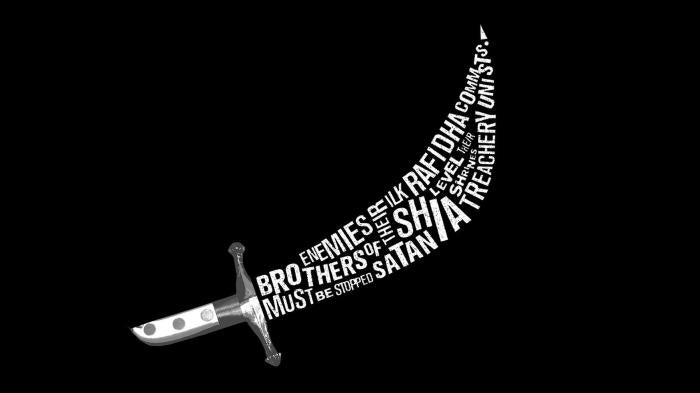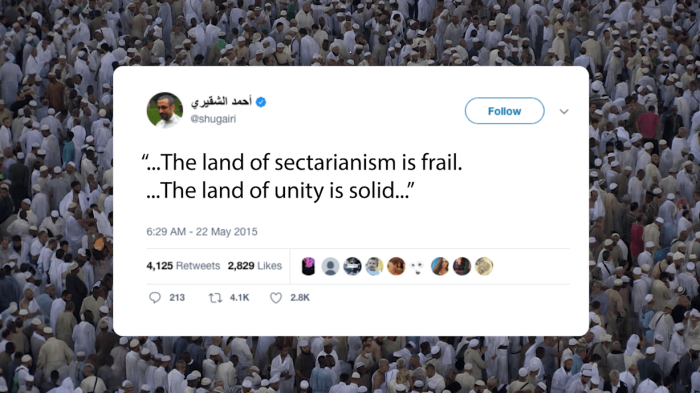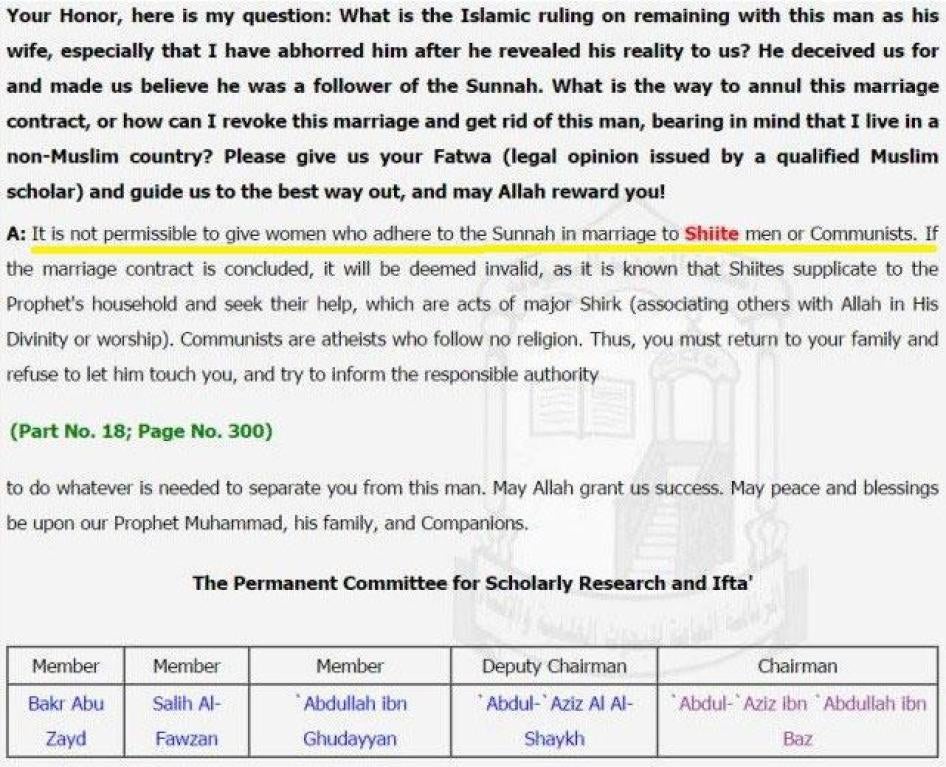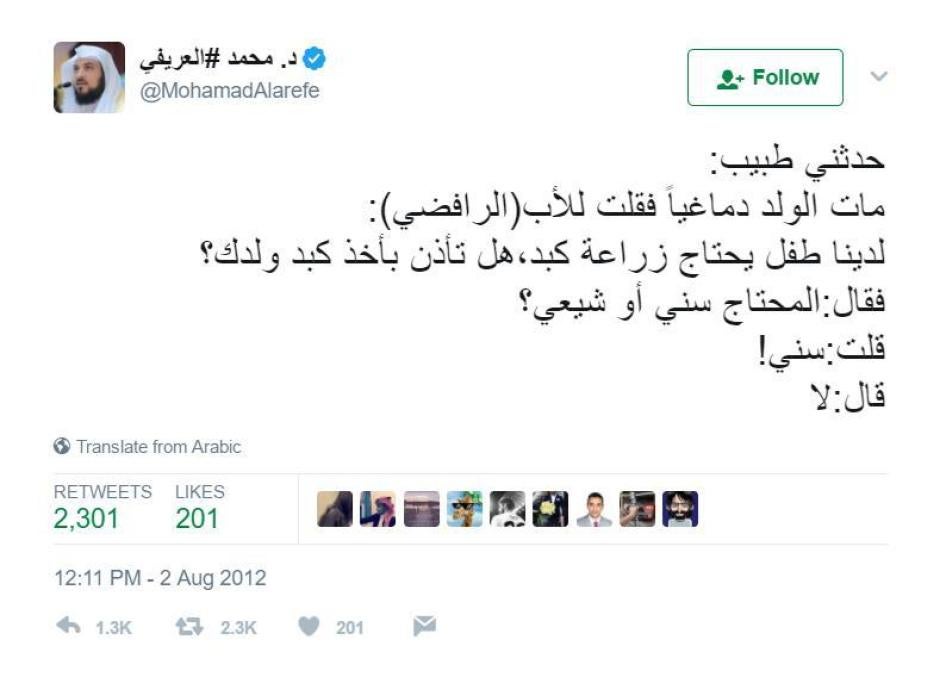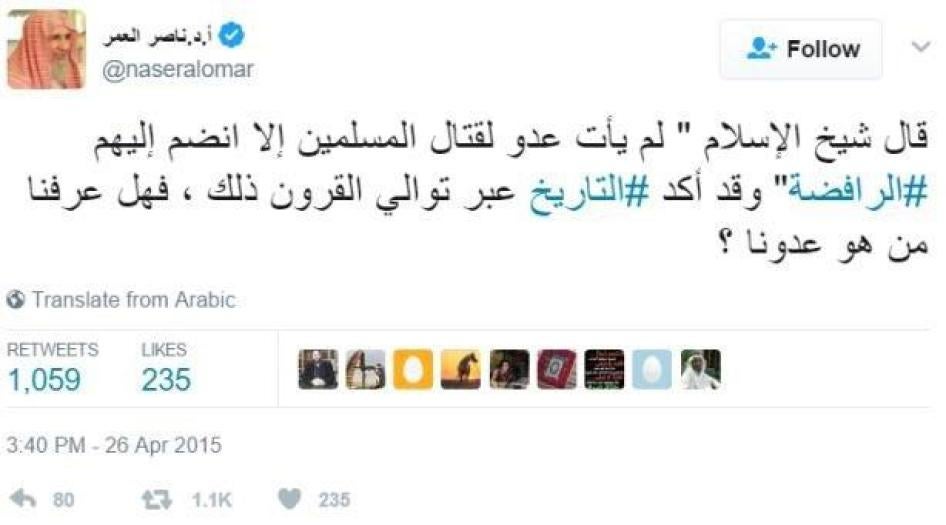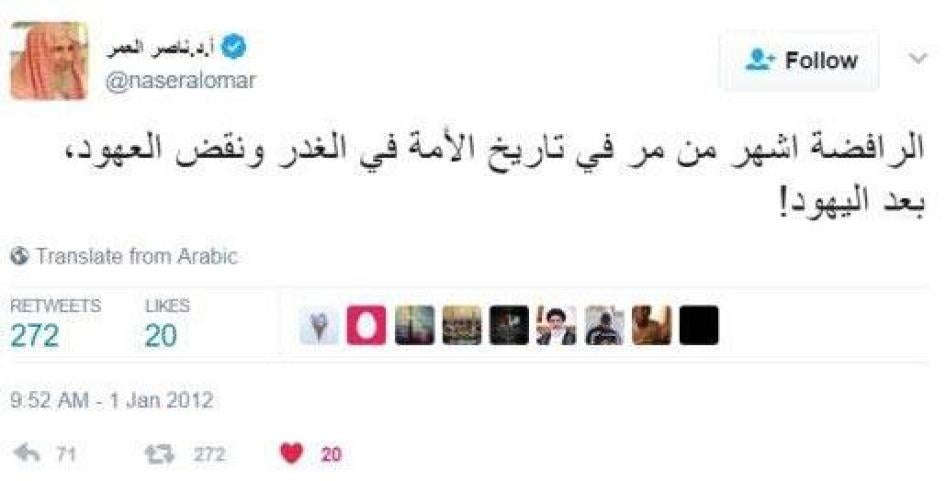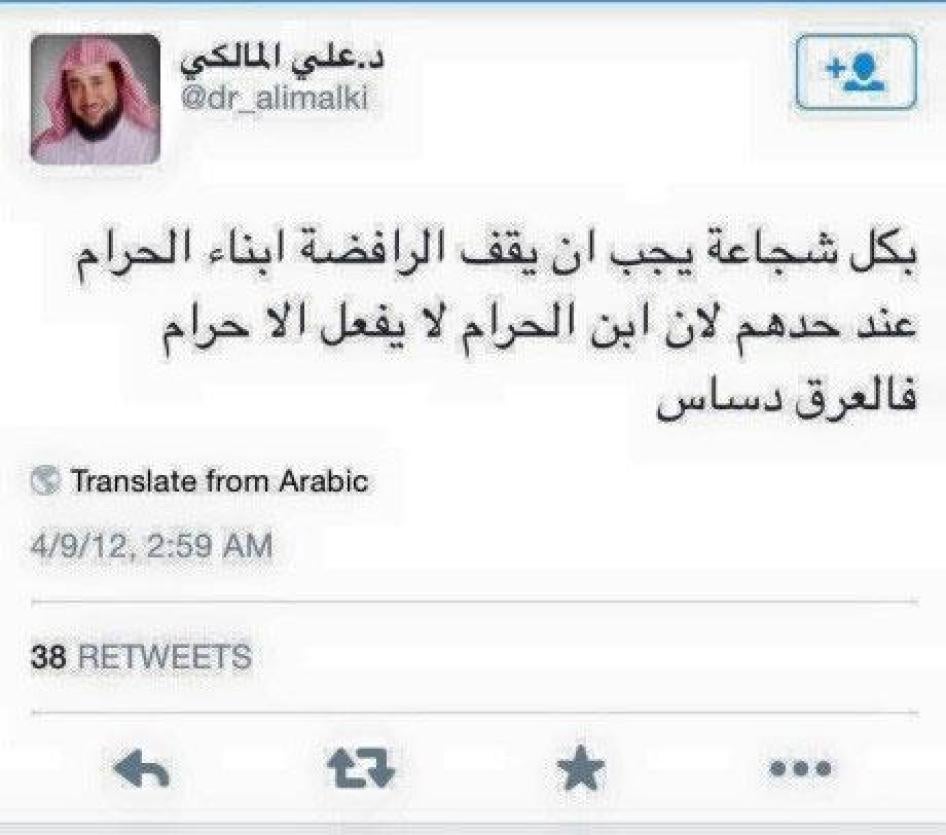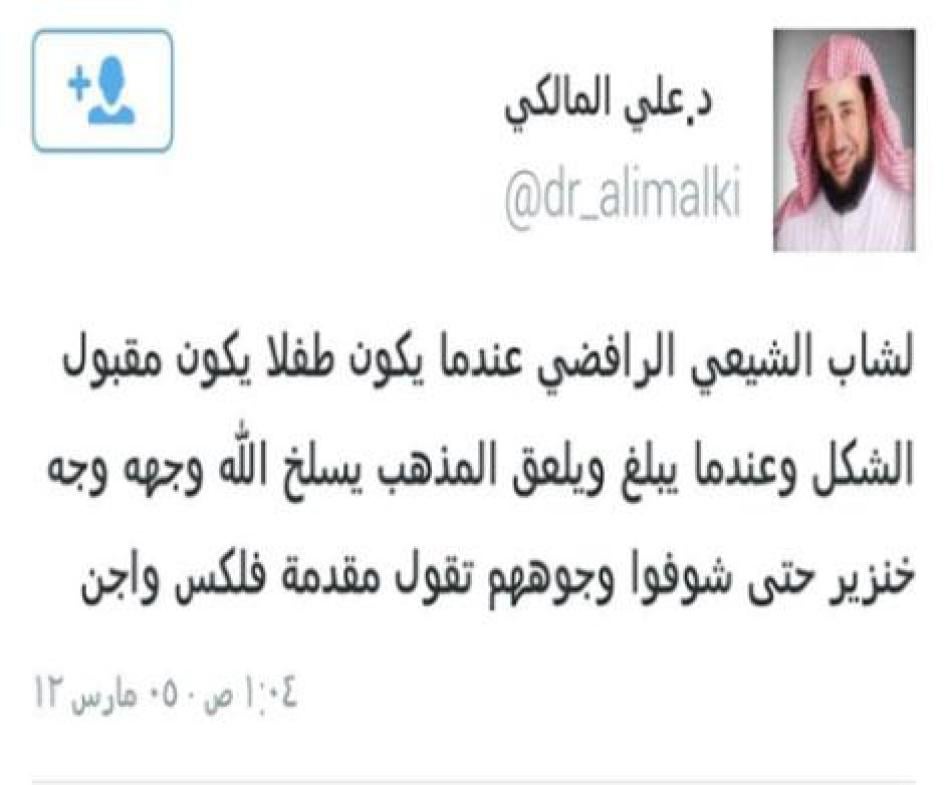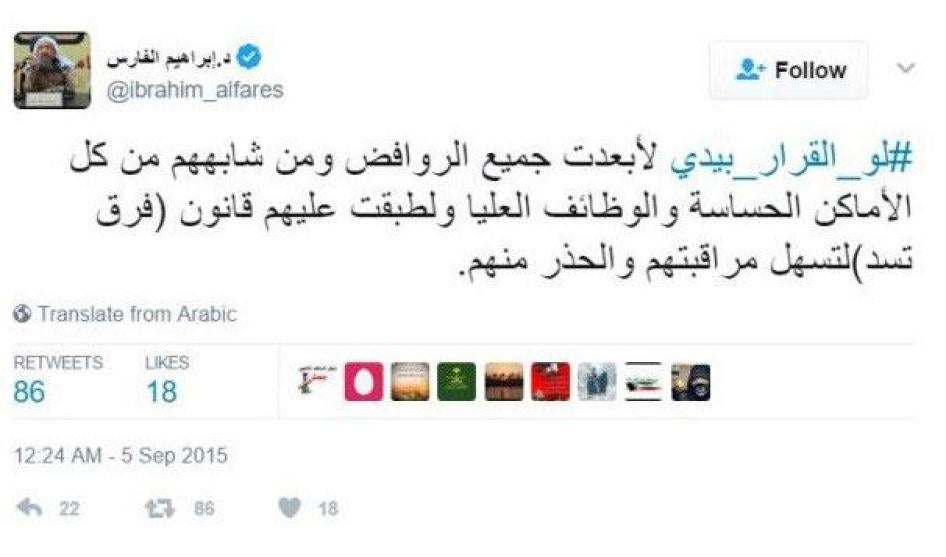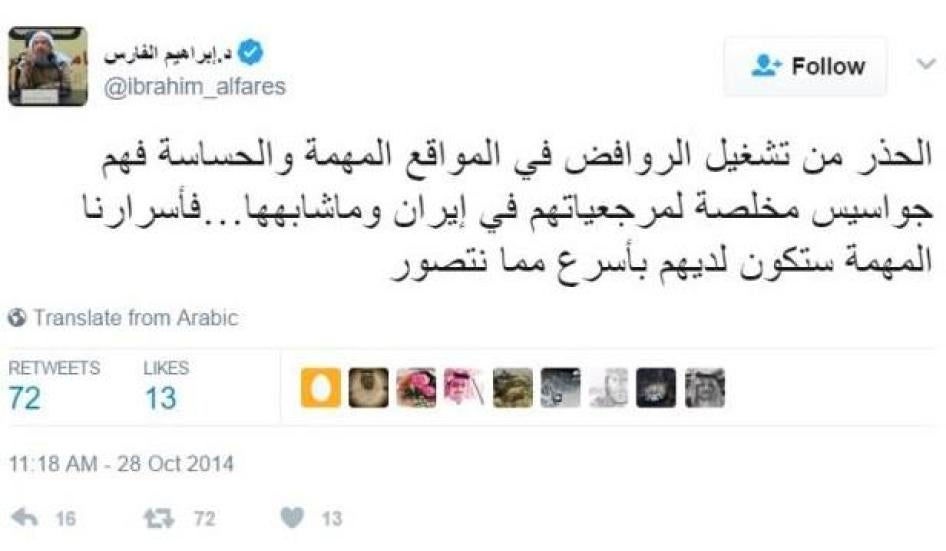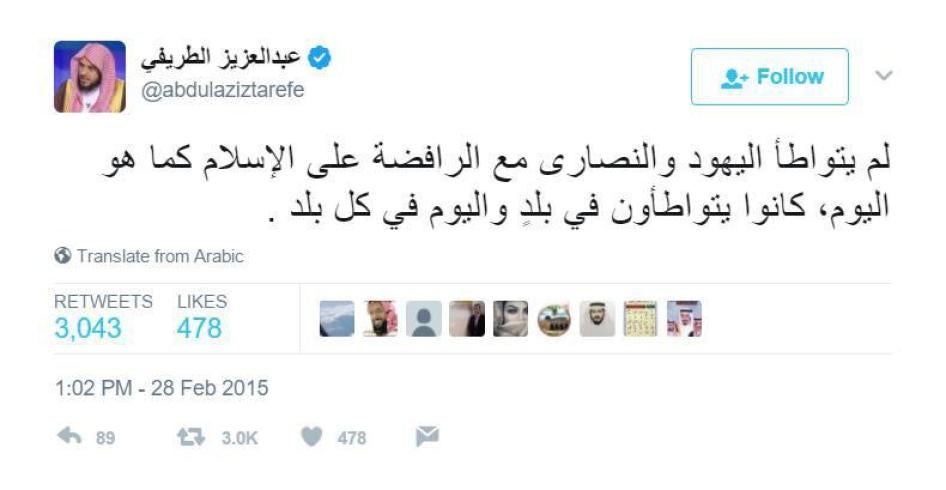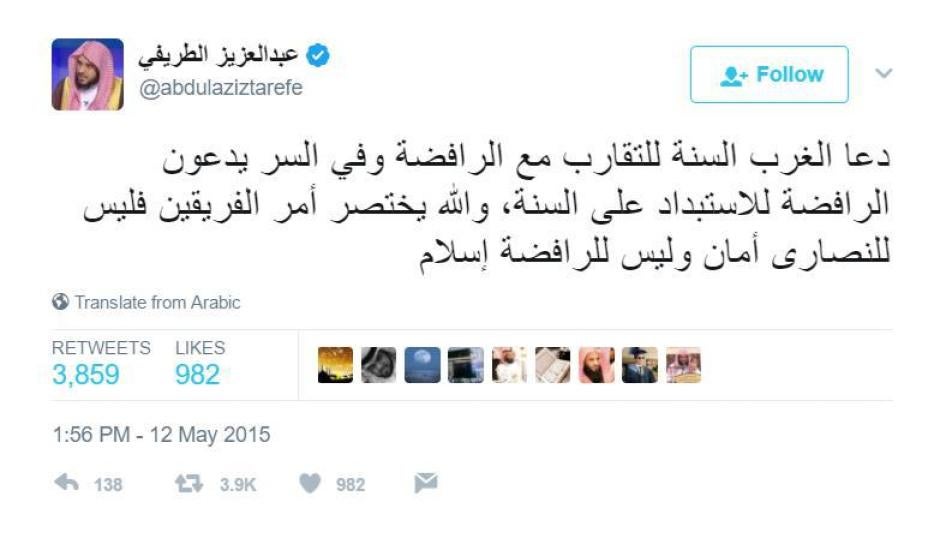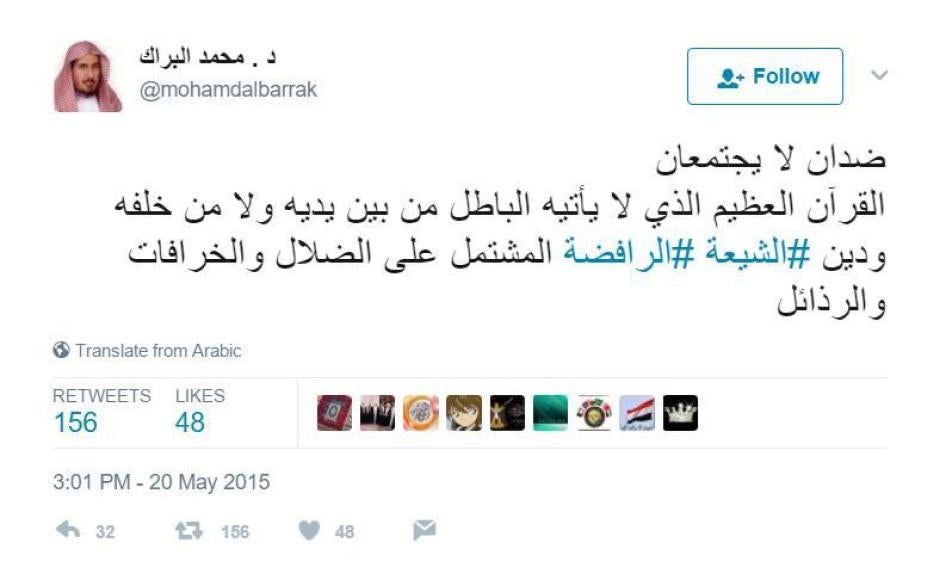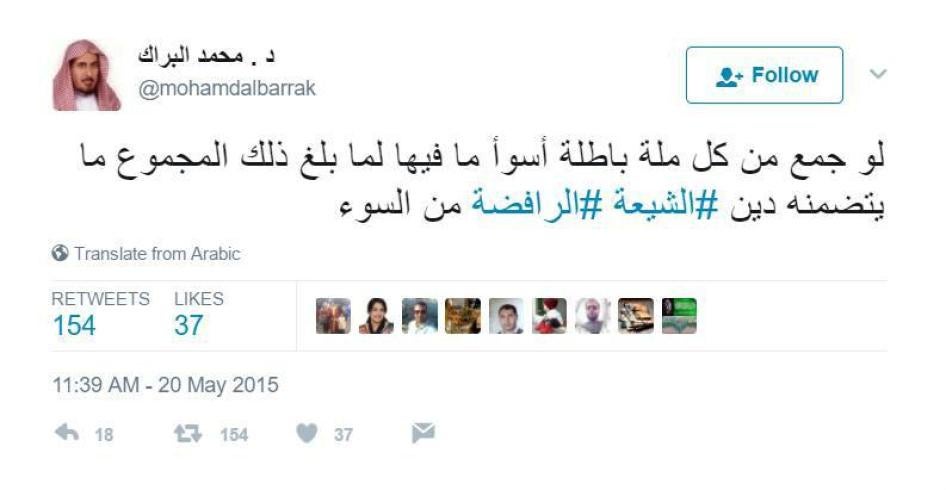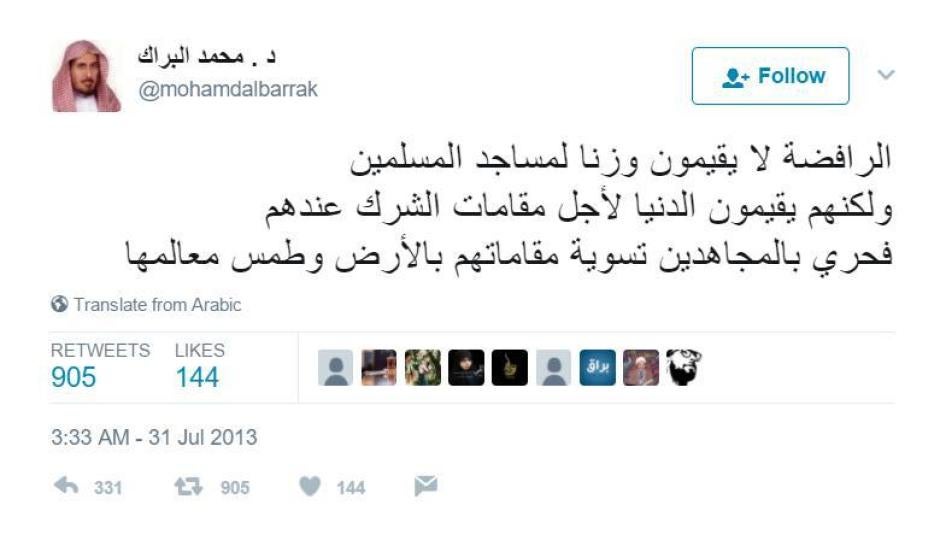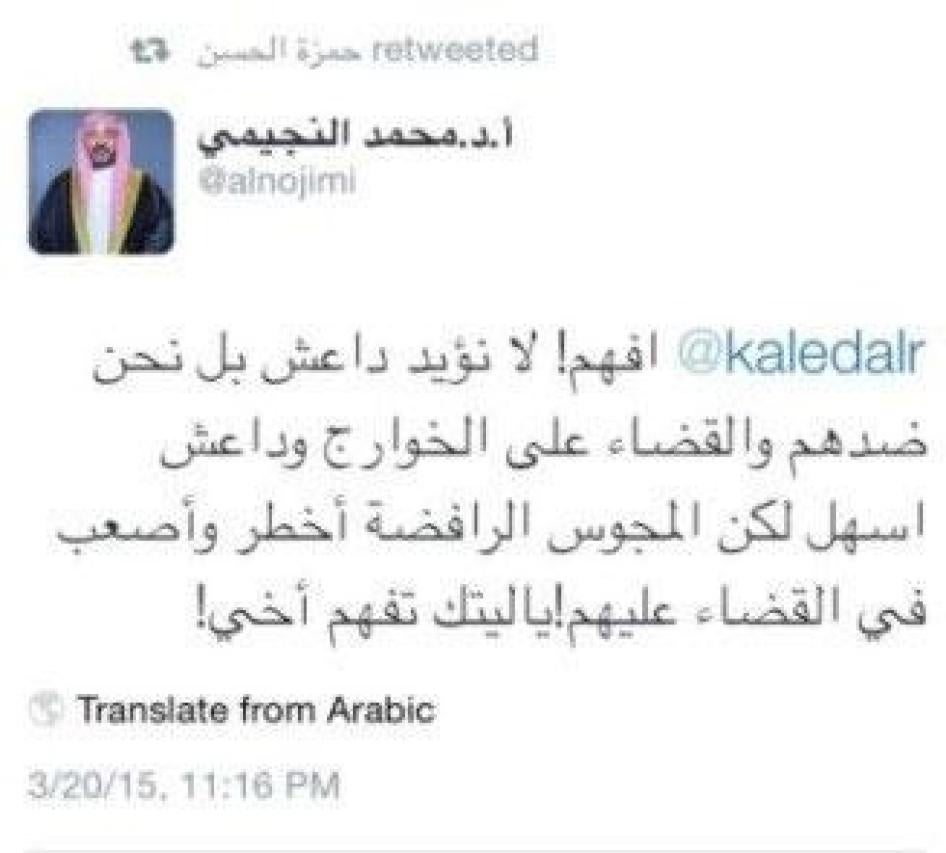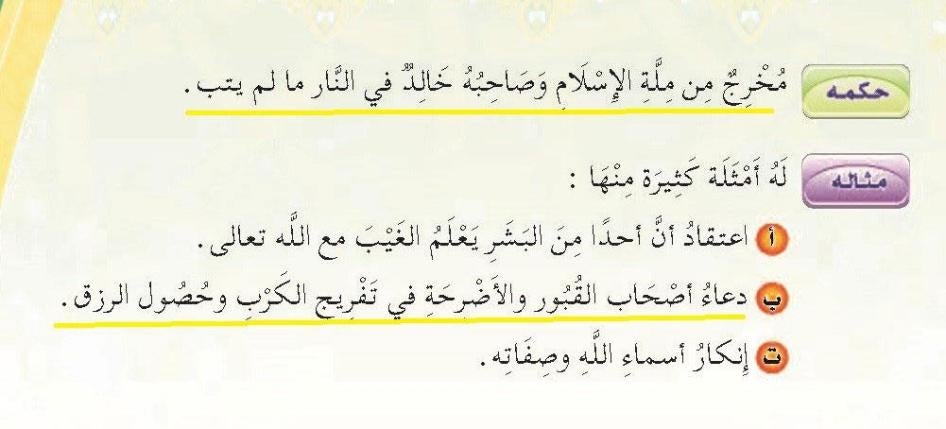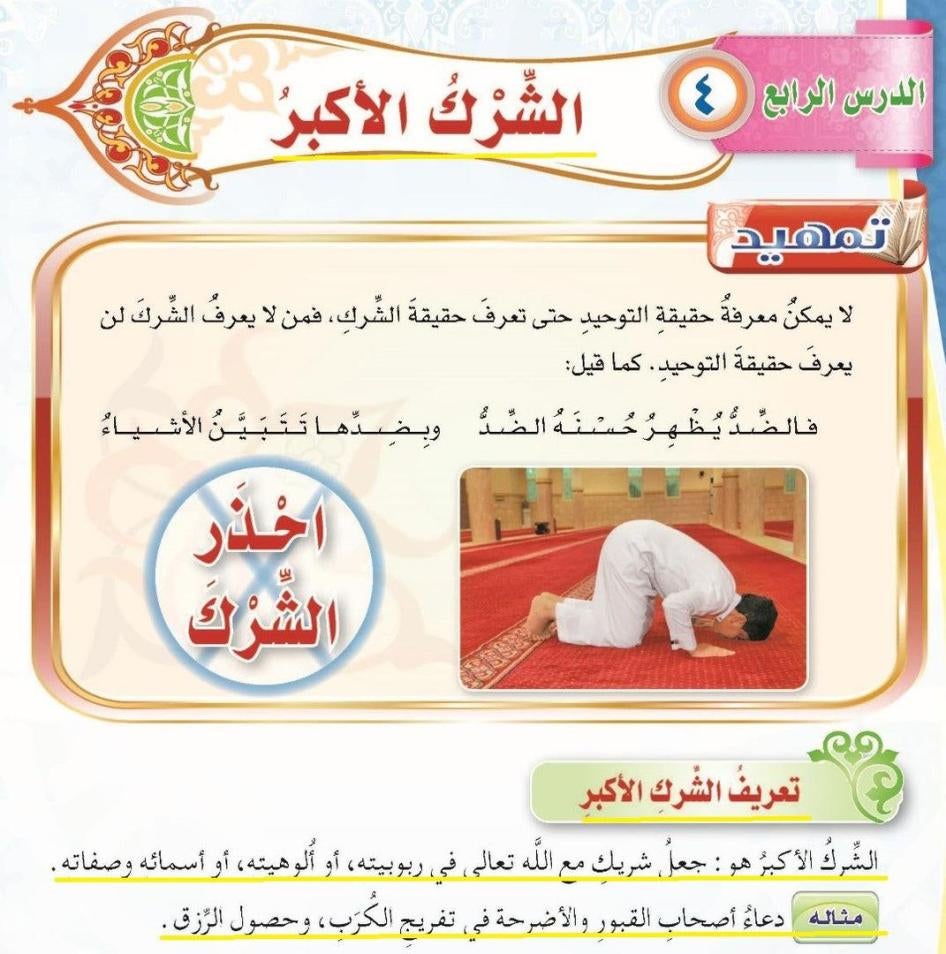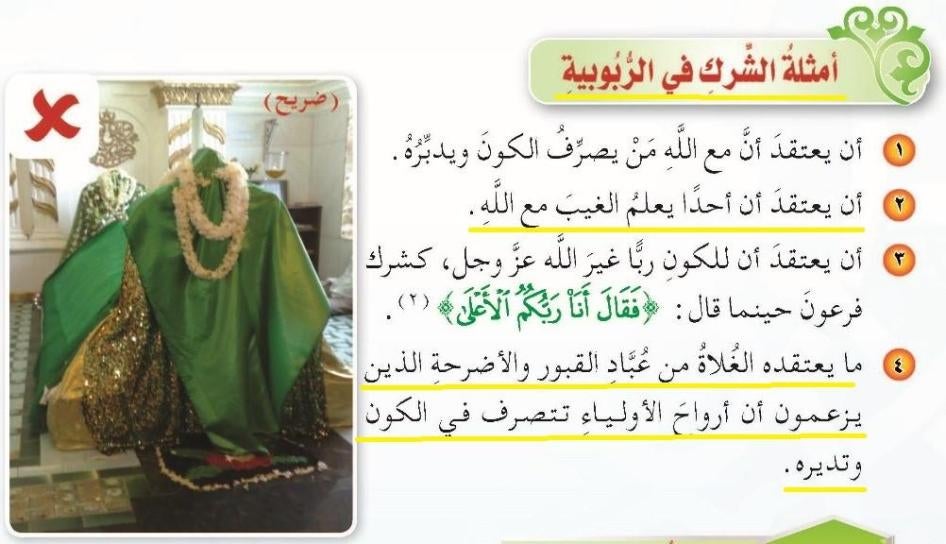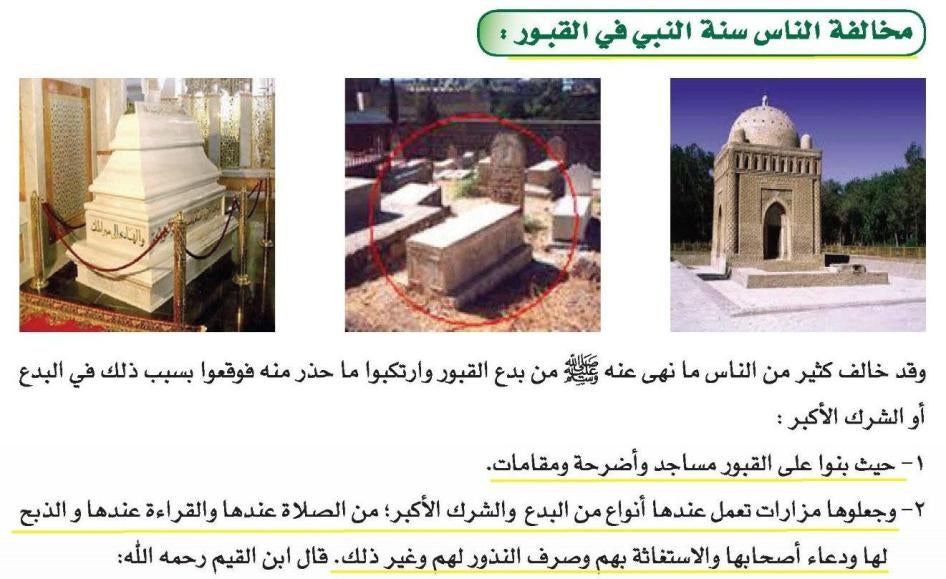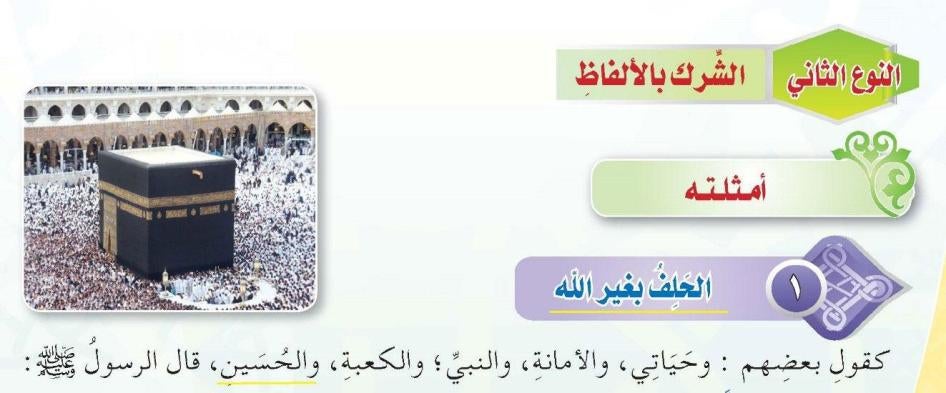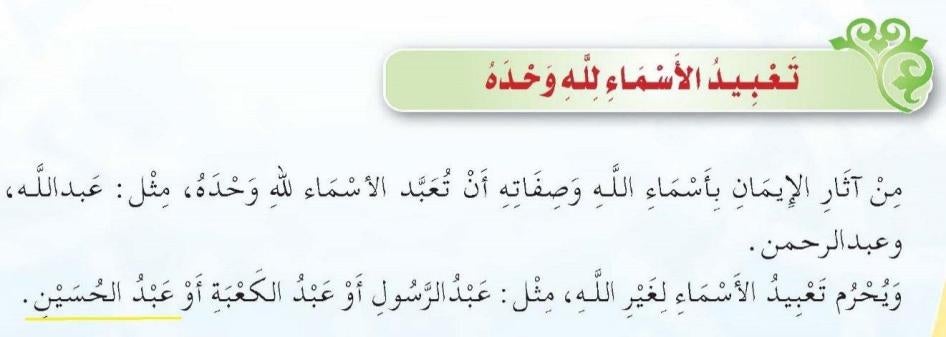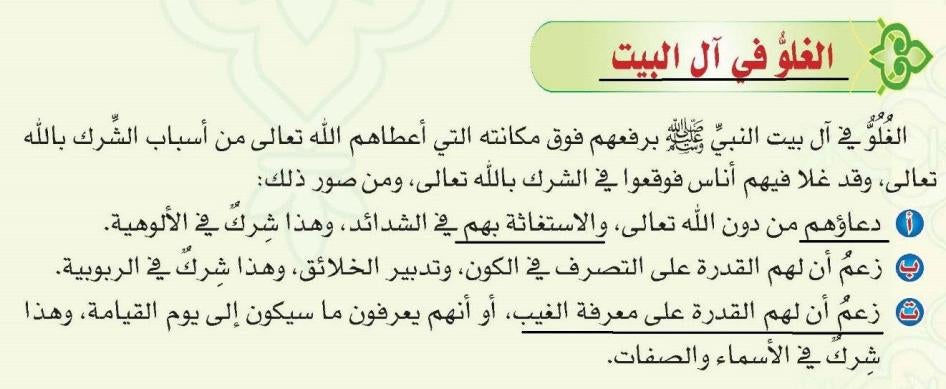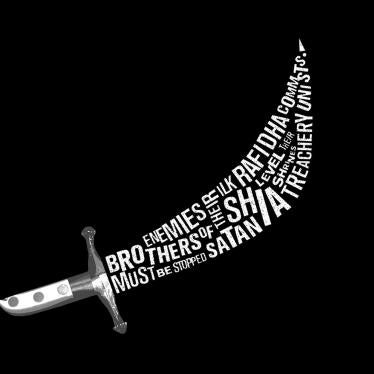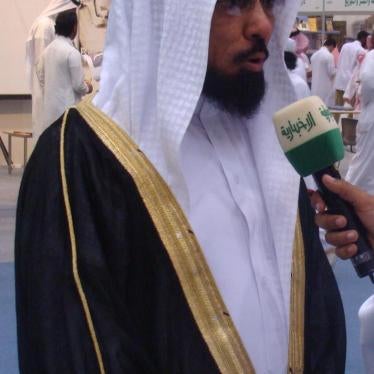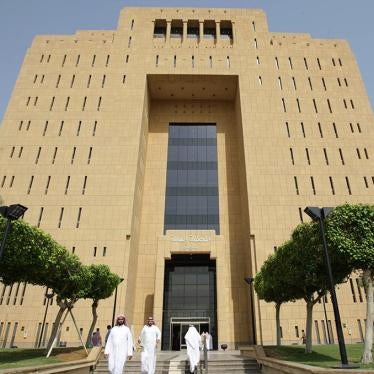Summary
The Kingdom of Saudi Arabia traces its origins to a 1744 pact between a religious leader Muhammad ibn Abd al-Wahhab, and the Al Saud family, under which al-Wahhab’s movement enabled the Saudi rulers to expand their political rule in return for enforcing his religious teachings. The power relations between the Saudi royal family and the clerics have changed over time, but the clerics and religious scholars continue to wield power and directly influence the policies and politics of the Saudi state, especially in the justice and education sectors.
Since its establishment, the Saudi state has permitted government-appointed religious scholars and clerics to refer to Shia citizens in derogatory terms or demonize them in official documents and religious rulings, which influence government decision-making. In recent years government clerics and others have used the internet and social media to demonize and incite hatred against Shia Muslims and others who do not conform to their views.
Saudi state-funded religious scholars, who generally follow the Hanbali school of Islamic jurisprudence, are variously described as “Wahhabi” after Muhammad ibn Abd al-Wahhab or “Salafi.” Salafism refers to a movement within Sunni Islam that developed in Arabia in the first half of the 18th century and advocated a return to the traditions of the “devout ancestors” (the salaf). There is extensive academic and political debate over these terms and their usage, as well as their relationship to a spectrum of Sunni religio-political movements, including the Salafi-Jihadi ideologies that have fueled armed groups such as al Qaeda and the Islamic State or ISIS. This debate is beyond the scope of this report, but further reading on this topic can be found in the sources cited in the footnotes.
The Saudi-sponsored “purist” Islamic belief and practice has influenced Muslims across the globe, but it is by no means uncontested. Many Sunnis regard this form of Islam as intolerant and extremist. Sufism in particular represents a strain of Islam, long popular among Sunnis and Shia alike, that shares many practices with mainstream Shia Islam, such as veneration of the prophet’s family and local saints. Therefore, like Shia Islam, Sufism has been a prime target of Saudi-sponsored hate speech and intolerant rhetoric.
International human rights law prohibits “[a]ny advocacy of national, racial or religious hatred that constitutes incitement to discrimination, hostility or violence.” Implementation of this prohibition by states over the years has been uneven and sometimes used as a pretext to restrict lawful speech or target minority groups. In order to address this problem, experts in recent years have proposed a six-part threshold test to establish whether any particular speech can be lawfully limited, including the context of the speech, the position of the status of the speaker, the intent of the speech, the content or form of the speech, the extent or reach of the speech, and an assessment of the risk of resulting harm of the speech.
Under this formula, Saudi religious scholars’ anti-Shia rhetoric documented in this report sometimes rises to the level of hate speech or incitement to hatred or discrimination. Other statements by Saudi religious scholars documented in this report do not rise to the level of hate speech or incitement to hatred or discrimination but nevertheless should be publicly repudiated and counteracted by Saudi authorities. Given the influence and reach of these scholars, these public anti-Shia statements are instrumental in Saudi Arabia’s enforcement of a system of discrimination against Shia citizens. This discrimination occurs in various areas, including refusal to permit Saudi Shia to build houses of worship outside limited Shia-majority areas, the imposition of a justice system that often displays anti-Shia bias, and an education curriculum that stigmatizes Shia religious beliefs and practices.
Government religious clerics often refer to Shia using derogatory terms such as rafidha or rawafidh, meaning “rejectionists,” and stigmatize their beliefs and practices. They have also condemned mixing between Sunnis and Shia as well as intermarriage. One current member of Saudi Arabia’s Council of Senior Religious Scholars, the country’s highest religious body, responded in a public meeting to a question about Shia Muslims by stating that “they are not our brothers ... rather they are brothers of Satan…”
Saudi Arabia’s former grand mufti, Abdulaziz Bin Baz, who died in 1999, condemned Shia in numerous religious rulings. Bin Baz’s body of fatwas and writings remain publicly available on the website of Saudi Arabia’s Permanent Committee for Islamic Research and Issuing Fatwas. They remain influential and are often cited in Saudi court rulings, which are based on Islamic law.
Some clerics use conspiratorial language when discussing Saudi Shia, accusing them of being a domestic fifth column for Iran and disloyal by nature.
In addition to government-affiliated clerics, the state likewise allows other clerics to employ enormous social media followings – some in the millions – and media outlets to stigmatize Shia with impunity.
In addition to statements by Saudi religious scholars, anti-Shia bias extends to the Saudi judicial system, which is controlled by the religious establishment and often subjects Saudi Shia to discriminatory treatment or arbitrary criminalization of Shia religious practices. In 2015, for example, a Saudi court sentenced a Shia citizen to two months in jail and 60 lashes for hosting private Shia group prayers in his father’s home in the Eastern Province town of Khobar, a city in which Saudi authorities do not permit Shia mosques to be built. In 2014, a Saudi Arabia court convicted a Sunni man of “sitting with Shia.”
The Saudi Ministry of Education religion curriculum also employs anti-Shia rhetoric. The religion curriculum for the 2016-17 school year does not mention Saudi Shia by name, but instead uses veiled language to stigmatize Shia religious practices as shirk, or polytheism or ghulah, “exaggeration.” Saudi religious education textbooks direct these critiques in particular to the Shia practice of visiting graves and religious shrines to venerate important religious figures and members of the family of the prophet, as well as tawassul, or intercession, by which Shia Muslims call on the prophet or members of the prophet’s family as intermediaries to God. The textbooks state that these practices, which both Sunni and Shia citizens understand as Shia, are grounds for removal from Islam and incur the punishment of being sent to hell for eternity. These beliefs about Shia are shared by many Sunnis outside Saudi Arabia, but in the Saudi context, the government textbooks perpetuate an anti-Shia narrative in Saudi society that serves to incite hatred against Shia citizens and maintain a system of discrimination against them.
Not only does the Saudi government tolerate hate speech, it sometimes imprisons those who criticize it. For example, in 2008, the government arrested prominent Shia cleric Sheikh Tawfiq al-Amer after he spoke out in a sermon against a statement signed by 22 prominent Saudi clerics in which they called Shia “an evil among the sects of the Islamic nation, and the greatest enemy and most deceptive to the Sunni people.” At the time the statement was issued, 11 of the 22 signatories were current government officials and 6 were former government officials. Al-Amer is currently serving an eight-year prison sentence for publicly demanding constitutional reforms.
Anti-Shia hate speech has fatal consequences when armed groups such as the so-called Islamic State or ISIS or al Qaeda employ it as a justification for targeting Shia civilians with violence. Since mid-2015, ISIS has carried out attacks against six Shia mosques and religious buildings in Saudi Arabia’s Eastern Province and Najran, killing over 40 individuals. ISIS press releases claiming these attacks stated that the attackers were targeting “edifices of shirk” and rafidha, which is the same language used by Saudi religious scholars and Ministry of Education textbooks in describing Shia citizens. Saudi officials immediately condemned these attacks, but they have not acted to stamp out the hate speech that supports them. ISIS has employed similar justifications for attacking Shia civilians and religious sites in Kuwait, Lebanon, Syria, and Iraq.
Following two of the ISIS attacks on Shia mosques in May in May 2015, Saudi Arabia’s Shura Council, the country’s highest advisory body, debated a proposed “Regulation on Protecting National Unity,” which would have criminalized hate speech, but Shura Council members ultimately rejected the proposal by a vote of 74 to 47.
Human Rights Watch supports the right to free expression, which is clearly set out in international law, and has repeatedly documented and criticized Saudi Arabia’s unlawful efforts to limit free expression and restrict critical debate on important political, social, or religious topics. Any lawful restriction on the content of expression concerning hate speech should address speech that is likely to incite violence, discrimination, or hostility against an individual or clearly defined group of persons in circumstances in which such violence, discrimination, or hostility is imminent and alternative measures to prevent such conduct are not reasonably available. Government agencies and officials, as well as others who effectively wield governmental authority or exercise effective control over territory and population, have a duty to refrain from speech advocating violence, discrimination, or hostility toward any individual or social group.
Human Rights Watch’s examination of statements and writings of Saudi clerics, courts, and textbooks in this report demonstrate that Saudi government officials and institutions have incited hatred or discrimination against its own Shia citizens, and that hostility and discrimination against Shia both in Saudi Arabia and beyond its borders directly resulted from these statements and writings. In addition to Shia, these hostile statements have also targeted Jews, Christians, Sufis, Zoroastrians, and others. Rather than turning a blind eye to such rhetoric, Saudi Arabia is obligated to halt or take measures to counter such speech.
The United States Commission on International Religious Freedom (USCIRF) has classified Saudi Arabia as a “country of particular concern” – its harshest designation for countries that violate religious freedom – repeatedly since 2004. Despite this designation, Saudi Arabia has not faced sanctions mandated for such countries under the 1998 International Religious Freedom Act (IRFA) because the law allows the US president to issue a waiver if the waiver would “further the purposes of IRFA” or if “the important national interest of the United States requires the exercise of such waiver authority.” The US president has issued a waiver for Saudi Arabia since 2006. Among the sanctions for countries of particular concern are private or public condemnation, delay or cancellation of scientific or cultural exchanges, denial or cancellation of US visas for officials, suspension of aid, or even prohibition of export or import agreements. The president of the United States should immediately rescind the waiver for Saudi Arabia and use the tools of the IRFA to push Saudi Arabia to halt incitement to hatred and discrimination against Shia Islam and other religions.
Saudi authorities should take immediate steps to end hate speech by state-affiliated clerics and bodies because of its role in undergirding and perpetuating its anti-Shia discrimination in Saudi society. They should also immediately dissociate the state from any cleric or preacher who uses rhetoric that incites hatred against Shia including by firing members of the Council of Senior Religious Scholars who have targeted Shia with hate speech. Saudi authorities should also take measures to counter hate speech by government and non-government clerics in the media and on social media.
Furthermore, Saudi Arabia should enact anti-discrimination legislation that would prevent anti-Shia bias in the justice and education system, allow Shia to build houses of worship and freely practice their religious beliefs on an equal basis with Sunni citizens, and authorities should reform the education curriculum to remove anti-Shia elements.
Recommendations
To the Government of Saudi Arabia
- Engage high religious officials, such as the office of the grand mufti, the Council for Senior Religious Scholars, and the Ministry for Islamic Affairs, Preaching, and Religious Guidance to rebut religiously intolerant speech by officials and other influential voices.
- Establish a committee to monitor anti-Shia hate speech on social media and publicly condemn such statements if they rise to advocacy of religious hatred that constitutes incitement to discrimination, hostility, or violence.
- Engage in broad efforts to combat negative stereotypes of, and discrimination against, Saudi Shia citizens and promote intercultural understanding.
- Remove all anti-Shia fatwas from the website of Permanent Committee for Islamic Research and Issuing Fatwas.
- Remove discriminatory language, criticism, and stigmatization of Shia and Sufi religious practices, as well as other religions, from the Saudi education curriculum, including the Tawhid series.
- Provide anti-discrimination training to Saudi judges and justice officials and prohibit criminalization of normal Shia religious practices.
- Agree to a longstanding request by the UN Special Rapporteur on the Promotion and Protection of the Right to Freedom of Opinion and Expression to conduct a country visit to Saudi Arabia.
- Establish a commission of equal citizenship, under the National Dialogue Center, and with a wide participation, including members of the Shura Council, the Human Rights Commission and the National Society for Human Rights, elected local councilors, and tribal, religious and community leaders of the Eastern Province. The Commission should consider recommending a national institution on discrimination, as suggested by the United Nations Committee on the Elimination of Racial Discrimination. The Commission should explore ways to:
- Protect freedom of worship for the Shia, especially in areas with a high Shia population, including freedom in the building and upkeep of mosques and husseiniyyas, printing, importing, and distribution of religious material, and the holding of public religious celebrations.
- Protect the freedom for parents to ensure their children receive a religious education in accordance with their beliefs, and for children to be able to choose and practice their own religion. This should include a right at school to abstain from or opt out of Sunni religious instruction that is contrary to Shia beliefs, and the right, wherever possible (and at a minimum in all areas where Shia form a significant percentage of the population), to receive religious instruction according to Shia beliefs on par with what Sunni pupils receive. Exercise of that right should entail allowing Shia to teach religion in schools.
- Ensure equality in employment and access to institutions of higher learning, including in the security services, high ministerial positions, local, provincial and the Shura Council, and military academies.
- Ensure equal access to justice, including by mandating that all persons are equal before the law regardless of their sectarian identity, and that qualified Shia jurists can work as judges in regular courts, especially in areas with a high Shia population.
- Establish a commission on holy places, to carry forward the Mecca June 2008 interfaith initiative organized by the Muslim World League, to explore ways to share space for religious worship in Mecca and Medina among adherents of different Muslim creeds while respecting Saudi Arabia's dominant religious practices. The commission should pay special attention to diverse staffing and appropriate training for security guards and officials of the Commission to Promote Virtue and Prevent Vice operating in such shared space for worship.
To the Government of the United States
- Rescind a waiver shielding Saudi Arabia from application of specific remedies mandated by the 1998 International Religious Freedom Act, including appropriate sanctions aimed at ending religious persecution for “countries of particular concern.”
- Enter into a binding agreement with Saudi authorities pursuant to the International Religious Freedom Act to end incitement to hatred or discrimination against Shia and Sufi religious practices, as well as other religions.
- Work with Saudi authorities to ensure removal of all criticism and stigmatization of Shia and Sufi religious practices, as well as other religions, from the Saudi education curriculum, including the Tawhid series.
Methodology
Saudi authorities have not granted Human Rights Watch access to freely conduct in-country research since a November-December 2006 research mission to the country. Human Rights Watch staff have visited Saudi Arabia six times since 2006, but most of these visits remained tightly circumscribed. Human Rights Watch visits to Saudi Arabia have, however, included trips to the Eastern Province for meetings with Shia intellectuals, activists, and victims of human rights abuses.
In addition to visits, this report relies on telephone interviews and social media communications with Saudi human rights activists, religion experts, and Saudi Shia living inside and outside Saudi Arabia. To protect those we interviewed from retaliation, we have withheld names or used pseudonyms for our sources, unless they indicated a willingness to be named.
Much of the material used in preparing this report, including court rulings, social media posts, and video clips were collected by Saudi activists and shared with Human Rights Watch. Other materials, such as fatwas by Saudi Arabia’s Permanent Committee for Islamic Research and Issuing Fatwas or the Saudi Tawhid education curriculum textbooks, are available online.
On July 10, Human Rights Watch sent a letter to the Saudi government enquiring about incitement to hatred or discrimination against Shia in Saudi Arabia. As of early September, Saudi authorities had not replied to Human Rights Watch.
Glossary
Ashura: The tenth day of the first month of the Islamic calendar, during which Twelver Shia religious communities hold mourning ceremonies commemorating the martyrdom of Hussein.
Fatwa (pl. Fatawa): a ruling on a point of Islamic law given by a recognized authority.
Ghulah (or Ghaliyah): a term used to denote a Shia sect that advocates the divinity of Ali, used pejoratively against Shia who “exaggerate” the position of the family of the prophet.
Houthis: officially “Ansar Allah,” is a Zaidi Shia-led religious-political movement from northern Yemen.
Ikhwan: the first Saudi army made up of traditionally nomadic tribesmen who formed a significant military force under Saudi ruler Abdulaziz Al Saud.
Imamiya: A name for Ithna Ashariya or “Twelver” Shia Islam.
Ismailiya: Seveners,” a branch of Shia Islam. Seveners believe in seven imams who are the spiritual and political successors to the prophet Mohammad.
Ithna Ashariya: “Twelvers,” the largest branch of Shia Islam. Twelvers believe in twelve imams who are the spiritual and political successors to the prophet Mohammad.
Jafariya: A name for Ithna Ashariya or “Twelver” Shia Islam.
Kharijites (or Khuwarij): Term applied to an early Islamic sect that rebelled against the fourth caliph Ali after he agreed to a ceasefire with his rival Mu’awiyah.
Majus: derogatory term applied to Zoroastrians.
Manuwiyyin: adherents of Manicheanism.
Muharram: first month of the Islamic calendar, during which Shia Muslims commemorate the martyrdom of the Imam Hussein.
Muwahiddin: advocates of tawhid or oneness of God, preferred moniker of followers of Mohammad ibn Abd al-Wahhab.
al-Radifha or al-Rawafidh: literally “rejectionists,” a term that has applied to various groups since the eighth century, but is often used today as a general derogatory term for Shia Muslims.
Ridda: apostasy from Islam.
Salafi: follower of the first generations of Muslims (the salaf).
Salafism: a movement within Sunni Islam that advocates a return to the traditions of the first generations of Muslims (the salaf).
al-Shirk: association of other beings with God, polytheism.
Sufism: the phenomenon of mysticism within Islam characterized by particular values, ritual practices, doctrines and institutions.
Tawhid: monotheism or oneness of God.
Zaydiya: a Muslim sect which emerged in the eighth century out of Shia Islam. Zaydis are mostly found in northern Yemen.
I. Background
Saudi Shia make up 10 to 15 percent of the Saudi population and have inhabited areas of the Arabian Peninsula since the early centuries of Islam. They are predominately adherents of the “Twelver” or Ithna-Ashariya Shia creed and live primarily in areas of the Eastern Province around the al-Ahsa Oasis and the old port town Qatif, with a small community in Medina known as the Nakawila. There is also a significant population of Ismaili or “Sevener” Shia Muslims located around Najran in southern Saudi Arabia along the Yemeni border.[1]
Shia communities have lived under Saudi rule since 1913, when Abdulaziz bin Saud, the founder of the modern Kingdom of Saudi Arabia, incorporated the areas of al-Ahsa and Qatif into his territory after the Ottoman rulers handed over the region to his advancing troops.[2]
The modern Saudi state is deeply intertwined with the Saudi religious establishment’s interpretation of Islam, which goes back to the origins of the Al Saud family’s rule over the territory more than two-and-a-half centuries ago. In 1744, the itinerant preacher Muhammad bin Abd al-Wahhab found refuge near today’s Riyadh with local chief Muhammad bin Sa'ud. They agreed to make common cause, with Abd al-Wahhab giving the ruler religious legitimacy integral to expand his realm, and the Al Saud family in exchange granting Abd al-Wahhab freedom to “purify” the inhabitants of what he saw as centuries of corrupt practices and to return them to the path of what he claimed to be “true” Islam.[3]
Abd al-Wahhab’s views on Shia Islam have heavily influenced the attitude of the Saudi state toward its Shia population. According to historians, king Abdulaziz “despised the Shiites,” but found himself caught between giving in to “the hatred that the Wahhabi 'ulama' have consistently shown toward Shiism,” and the realities of the Shiite areas’ high population not being easily subdued without large numbers of troops. Moreover, there were tangible benefits in being able to tax Shia financial resources to fund Saudi expansionism, in addition to the need to accommodate international diplomacy, especially British interests in the Gulf.[4]
Nevertheless, the new Saudi state initially allowed “Wahhabi zealots [to] implement ... a repressive religious policy” toward the Shia, including demands of forced conversion.[5] In 1927, facing criticism from his Wahhabi fighting force, the Ikhwan, Abdulaziz permitted the issuance of a fatwa, or Islamic legal ruling, which called for the conversion of the Shia of al-Ahsa to Sunni Islam and proselytization of Abd Al-Wahhab’s version of Sunni Islam in Shia areas of Qatif.[6] This fatwa referred to Shia Muslims as rafidha, a term that means “rejectionist” and has been applied to various groups since the eighth century, but is often used today as a general derogatory term for Shia Muslims.[7] When conflict later arose between the Ikhwan and the king, the Ikhwan were crushed and disbanded in 1930, and repression of the Shia eased.[8]
Since the 1930s the Saudi royal family has historically attempted to act as an “arbiter” between influential Saudi clerics and Shia citizens by implicitly “protecting” them from the most extreme Wahhabi demands for the forced conversion or execution of Shia, while concurrently placating Sunni clerics by ensuring that Shia religious practices are largely kept out of public view.[9]
The severity of government repression of Shia citizens has fluctuated over the years, and consequently the Shia have maintained a fraught historical relationship with the state, erupting in civil disobedience campaigns as well popular protests on several occasions, including in the 1950s, 1979, and 2011-12. These demonstrations have demanded, among other things, an end to religious, political, and economic discrimination.[10]
State Discrimination Against Saudi Shia
Saudi Shia face systematic discrimination in the education system, the criminal justice system, religious practice, and in political participation.[11]
According to Saudi activists, Saudi Shia do not study Islamic Law at Saudi universities because of the anti-Shia biases of university law faculties and therefore Saudi Shia are not permitted to teach religion class in Saudi schools. All Shia pupils learn from Sunni teachers via the state-sponsored Sunni education curriculum. Interviewees claim that in practice Shia citizens are not permitted to serve as school principals outside of Shia enclaves.[12]
Nearly all judges and prosecutors in Saudi Arabia are Sunni; they are generally graduates of Sharia-law studies programs at Saudi governmental universities. In criminal cases, Sunni judges sometimes disqualify Shia witnesses on the basis of their sect and exclusively follow tenets of Sunni religious law in making their rulings. Since 1980, Saudi Arabia has officially permitted the existence of two courts in the Eastern Province to settle personal status, endowments, and inheritance issues for Saudi Shia according to the Shia Jaafari school of jurisprudence.[13]
Saudi authorities also inhibit Shia religious practices. In March 2016, Saudi authorities banned mosques in al-Ahsa from broadcasting the Shia version of the Muslim call to prayer, and authorities have disallowed Ashura processions in al-Ahsa since 1913.[14] In July
2015, Saudi Arabia’s health ministry suspended a female nurse for one day without pay because the sound of her mobile phone ring tone was the Shia call to prayer. (see figure above).[15]
Saudi authorities generally prohibit the building of Shia mosques outside Shia-majority enclaves. There are no licensed Shia mosques in Saudi major urban centers like Jeddah, Riyadh, or al-Khobar, where many Shia live.[16] The lone exception to this ban is Imam Hussein Mosque in Dammam’s al-`Anoud neighborhood, which Saudi authorities allowed to be built in the 1980s following extensive negotiations.[17] ISIS militants bombed the Imam Hussein Mosque on May 29, 2015, killing four men.[18]
Saudi activists told Human Rights Watch they were unaware of any cases in which Sunni citizens were punished for hosting prayers in communal halls or private homes, although there were several such cases involving Shia citizens. The activists said that without mosques, private meetings were the only way they could pray communally.[19]
The activists also said that Shia also face difficulties establishing Shia cemeteries outside of Shia enclaves. The government has refused to build cemeteries for Shia or allow them to bury their dead in regular cemeteries, meaning that when Shia die outside of Shia enclaves in Saudi Arabia their bodies must be sent to a Shia enclave for burial.[20]
Furthermore, Saudi Arabia has historically excluded Saudi Shia from serving in certain public-sector jobs and high political office. There are currently no senior Shia diplomats or high-ranking military officers. Shia students generally cannot gain admission to military or security academies or find jobs within the security forces.[21] In 2014, then-king Abdullah appointed the first-ever Shia cabinet member, an Ismaili named Mohammed Abu Saq, who serves as minister of Shura Council affairs.[22] Saudi Arabia has only ever appointed one Shia ambassador, Jamil al-Jishi, who served as Saudi ambassador to Iran between 1999-2003.[23] No Shia woman has ever held a high-level political position.
Even attempts to bridge Sunni-Shia divides sometimes face government sanction. In November 2006, Saudi authorities pressured Shia religious scholars to disband a group they had formed to attempt, together with the national astronomical society, to unify diverse theological methods to detect the arrival of the new moon. The Islamic calendar is based on the lunar year, and differences over dating the new moon, which heralds the start of religious holidays, is a matter of frequent Sunni-Shia contention.[24] On February 4, 2007, the Saudi police arrested Mikhlif al-Shammari, a Sunni human rights activist working toward greater Shia-Sunni understanding, and detained him for three months for having visited Shaikh Hasan al-Saffar, the top Shia cleric in Saudi Arabia.[25] Saudi Arabia’s Specialized Criminal Court later sentenced al-Shammari in 2013 to five years in prison for “sowing discord” and criticizing Saudi officials in his online writings. In 2014 another criminal court sentenced him to two years in prison and 200 lashes for “sitting with Shia” among other speech-related offenses.[26]
The Saudi state, the government-supported Saudi religious establishment, and some elements of the wider Saudi Sunni community’s hostility and suspicion toward Saudi Shia reflects not just religious intolerance but also escalating sectarian tensions arising from broader regional dynamics. These include the Saudi-led coalition and the internationally recognized Yemeni government’s conflict against the Zaydi Shia Houthi armed group (also known as Ansar Allah) in Yemen; the Shia politico-militant group Hezbollah’s political dominance in Lebanon; the sectarian cleavages in Syria that have deepened during the six-year civil war; Shia parties’ dominance over Iraqi politics; and fears on the part of Israel and Arab Gulf states about the influence of Shia-majority Iran over the Shia populations of Iraq, Lebanon, and the Gulf states, including Saudi Arabia. Saudi foreign policy has exacerbated these tensions not only in the Yemen conflict but also in Bahrain, where it has supported the minority Sunni monarchy’s repression of both Sunni and Shia opposition groups.[27]
Anti-Shia Court Rulings
In addition to statements and comments by government officials, anti-Shia bias has also presented itself within the criminal justice system, which is entirely staffed by Sunni religious scholars. As of April 2017, Human Rights Watch does not know of any Shia citizens who have served as prosecutors or judges in criminal courts.[28] Shia to whom Human Rights Watch spoke almost universally alleged that false claims against Shia based on religiously motivated charges, such as cursing God, the Prophet, or his companions, are a staple of discriminatory acts against Shia.[29] In 2014, one Saudi Shia man claimed that the personal status court in Dammam had refused to hear his testimony because he was Shia.[30]
Human Rights Watch discovered and analyzed court rulings that appear to criminalize practice of Shia Islam or even contact with Shia Muslims. For example, on July 9, 2015 a Saudi court sentenced Shia citizen Zahir Hussein al-Bu Saleh to two months in jail and 60 lashes for hosting private group prayers in his father’s home in the Eastern Province town of Khobar, a city in which Saudi authorities do not permit Shia mosques to be built.
Eastern Province-based activists told Human Rights Watch that intelligence officials summoned al-Bu Saleh in late May, held him for a day, and referred his case for prosecution. He was summoned two days after a suicide bomber affiliated with the extremist group Islamic State, or ISIS, blew himself up inside a Shia mosque in the village of Qudaih, killing 23 people and wounding over 100.[31]
The official case notification document sent to al-Bu Saleh by the Khobar Criminal Court on June 25, which Human Rights Watch reviewed, says the case involves “violating Sharia or public rules of conduct.” (see figure on the following page)
According to local activists and media reports, the court convicted and sentenced al-Bu Saleh in a 15-minute session on July 9.[32]
In another case, in 2015, a Saudi court reportedly sentenced a 43-year old Saudi Shia woman and mother of seven to three months in jail and 120 lashes for reciting Shia slogans under her breath at the prophet’s mosque in Medina. Authorities originally arrested the woman, Noura al-Hanfoush, during the 2014 Hajj season, after an Egyptian woman heard her quietly reciting slogans and reported her to the police.[33]
In a third case, in 2014 the Medina Criminal Court sentenced a Saudi Shia man to one year in prison and a fine of 50,000 Saudi Riyals ($9,450) for “writing or sending something that harms public morals” over a tweet on the social media platform Twitter in which he wrote: “I thought one day that Iran was the fire-worshiping Islamic Republic but after Abu Mit`ib [the late King Abdullah] invited them to Mecca it is confirmed that they are Muslims regardless of the fire worshiping Wahhabis.” According to the trial judgment, authorities immediately arrested the man even though he deleted the tweet.[34]
In a fourth case, the Khobar Criminal Court convicted Mikhlif al-Shammari on November 3, 2014 and sentenced him to two years in prison and 200 lashes for, in part, visiting a prominent Shia family in the Eastern Province in January 2013 after he had pledged to cease “inciting public opinion.”[35] He had made this pledge as a result of a previous criminal case, involving his critical writings and human rights work. The trial judgment included “sitting with Shia” among his alleged “crimes.” (see figure below):
Al-Shammari is the Eastern Province representative of a large Sunni clan from the central Najd region and has sought to improve relations between Sunnis and Shia.[36] He made national headlines in 2008 when he visited a Shia mosque in Qatif and prayed next to a Shia religious leader in a show of solidarity.[37]
In a fifth case involving 32 men for allegedly spying on behalf of Iran, Saudi authorities rounded up the suspects in 2013 and 2014, but did not bring them to trial until February 2016. The date is significant because in January Saudi Arabia and Iran cut diplomatic relations after Saudi Arabia executed a prominent Saudi Shia cleric, Nimr al-Nimr, and Iranian protesters sacked the Saudi embassy in Tehran in retaliation.
Dubbed the “Iran Spy Trial,” Saudi authorities accused the men of a number of offenses constituting “high treason,” including meeting with Iranian “intelligence agents” and passing them confidential military information and background information on Shia communities in Mecca, Medina, and Saudi Arabia’s Eastern Province. But among charges that do not represent recognizable crimes, six were charged with “supporting demonstrations,” three with “distorting the reputation of the kingdom,” and three with attempting to “spread the Shia confession” in Saudi Arabia. One faced the charge of “planning with an Iranian intelligence element… to establish a company to spread Shia activities in [Eastern Province.]…”[38] (see figures below):
Another faced the charge of “endeavoring and attempting to establish a center especially for the Shia confession in the city of Mecca to spread the Shia confession in Mecca.”[39] (see figure below)
On December 6, 2016, the Specialized Criminal Court convicted 30 of the 32 men, sentencing 15 to death and 15 to 25 years in prison following an unfair trial.[40]
Saudi Shia have also alleged that dozens of Saudi Shia arrested following popular protests in the Eastern Province in 2011-12 were subjected to unfair trails and harsh judgments for protest-related activities. Human Rights Watch obtained and analyzed seven separate trial judgments that the Specialized Criminal Court handed down in 2013 and 2014 against men and children accused of protest-related crimes. In all seven trials, detainees alleged that confessions were extracted through torture, but judges quickly dismissed these allegations without investigation, admitted the confessions as evidence, and then convicted the detainees almost solely based on these confessions, sometimes handing down death sentences.[41]
In nearly all the trial judgments analyzed by Human Rights Watch, defendants repudiated their confessions, saying they were coerced in conditions that in some cases amounted to torture, including beatings and prolonged solitary confinement. The court rejected the allegations out of hand without, in any of the cases reviewed by Human Rights Watch, appearing to take any steps to investigate the allegations of torture. Some defendants asked judges to request video footage from the prison that they said would show them being tortured. Others requested that the court summon interrogators as witnesses to inquire details on how confessions were obtained. In all cases judges ignored these requests. Two of the cases involved three defendants whom judges sentenced to death for crimes allegedly committed before they were 18.[42] In total, the Specialized Criminal Court has sentenced over 40 Saudi Shia to death over the protest, including prominent Shia cleric Nimr al-Nimr, whom Saudi authorities executed on January 2, 2016.[43]
In a sixth case, the Criminal Court of al-Ahsa in March 2017 sentenced a Saudi Shia man to 50 days in jail and 120 lashes for using his home to host readings of the passion play on the killing of the Imam Hussein, a common Shia practice during the month of Muharram.[44]
II. International Legal Standards
Hate Speech
States’ obligations regarding hate speech, including incitement to violence or discrimination, represent a developing area of international human rights law and are closely related to the right to freedom of expression. These obligations are addressed formally by the International Covenant on Civil and Political Rights (ICCPR), which Saudi Arabia has not signed, but which represents an authoritative source and guideline that reflects international best practice.
Article 19 of the ICCPR guarantees the right to freedom of expression. The ICCPR permits governments to impose certain restrictions or limitations on freedom of expression only if such restriction is provided by law and is necessary: (a) for respect of the rights or reputations of others; or (b) for the protection of national security or of public order (ordre public), or of public health or morals. [45] Article 32 of the Arab Charter on Human Rights, which Saudi Arabia ratified in 2009, also guarantees the right to freedom of opinion and expression and to impart news to others by any means. Like the ICCPR, the Arab Charter allows for some restrictions, including those imposed for “respect for the rights of others, their reputation, or the protection of national security, public order, public health, or public morals.”[46]
The UN Human Rights Committee, which provides the authoritative interpretation of the ICCPR, wrote in General Comment 34: “Restrictive measures must conform to the principle of proportionality; they must be appropriate to achieve their protective function; they must be the least intrusive instrument amongst those which might achieve their protective function; they must be proportionate to the interest to be protected.” The committee also stated that such restrictions “may never be invoked as a justification for the muzzling of any advocacy of multi-party democracy, democratic tenets, and human rights.”[47]
Saudi Arabia could therefore formally restrict incitement to discrimination or hatred provided it could show that such measures are necessary under the conditions established by the ICCPR and that the measures taken are proportional to the threat posed by such speech, are appropriate to achieving the goal of stopping hate speech, and are the least intrusive option.
In addition to allowing states to limit hate speech under certain limited conditions, the ICCPR also formally obliges states to prohibit the worst forms of hate speech such as incitement to hatred and incitement to discrimination. Article 20.2 states, “Any advocacy of national, racial or religious hatred that constitutes incitement to discrimination, hostility or violence shall be prohibited by law.”[48] States therefore must formally prohibit and take criminal measures against those who engage in such forms of hate speech.
Due to increasing international attention around the issue of hate speech, in 2011 the UN High Commissioner for Human Rights convened a series of expert workshops on the application of article 20 of the ICCPR. These experts noted serious flaws, including “the absence of the legal prohibition of incitement to hatred in many domestic legal frameworks around the world,” and the use of “variable terminology” that “is often inconsistent with article 20” in various legal provisions that do exist.[49] The experts further observed that attempts to apply article 20 have sometimes resulted in the use of vague blasphemy laws, which are counterproductive because they limit religious belief, dialogue, and debate, and there are “numerous examples” of the use of these laws to persecute religious minorities and dissenters.[50]
In 2012, these experts attempted to provide a path forward via the Rabat Plan of Action, which analyzes the issue of hate speech and makes specific recommendations for states attempting to comply with article 20 while upholding the right to freedom of expression and minority rights. The plan proposes a “high threshold for defining limitations on freedom of expression, for defining incitement to hatred, and for the application of article 20,” arguing that “incitement to hatred must refer to the most severe and deeply felt form of opprobrium.”[51] The experts therefore proposed a six-part threshold test to establish whether any particular speech can be lawfully limited, including the context of the speech, the position of the status of the speaker, the intent of the speech, the content or form of the speech, the extent or reach of the speech, and an assessment of the risk of resulting harm of the speech.[52]
Under this formula, it is Human Rights Watch’s firm conclusion that many comments by Saudi religious officials and other government employees could be lawfully restricted as incitement to hatred or discrimination, especially given that the Saudi state already enforces a system of discrimination against Saudi Shia. These officials hold high government positions and have a clear role in and influence on government decision-making, including determining the content of the religious education curriculum in Saudi schools. Many also exert enormous influence through newspapers, TV shows, and social media, including Twitter followers numbering in the millions. These officials are also able to directly influence the administration of justice in Saudi Arabia, given that the justice system is entirely composed of religiously-trained jurists and lawyers tasked with applying Saudi Arabia’s interpretation of Islamic law.[53]
For other types of hate speech that do not meet the high threshold, the Rabat Plan of Action recommends that states should take other positive measures to combat such speech outside of legislation. These measures include “engagement in broad efforts to combat negative stereotypes of, and discrimination against, individuals and communities on the basis of their nationality, ethnicity, religion or belief,” promotion of intercultural understanding, and setting a “public policy and regulatory framework which promotes pluralism and diversity of the media.”[54]
Saudi Arabia should, at a very minimum, cease to support or provide a platform for officials who issue hate speech against Shia citizens and take active steps to combat anti-Shia discrimination and bias. When speech by these officials or private individuals rises to the level of incitement to hatred or discrimination, Saudi authorities have a duty to halt such speech through criminal legislation and other means, but only in a restrictive manner consistent with international human rights standards.
Discrimination Against Religious Minorities
International law prohibits discrimination based on religion and protects the rights of religious and other minorities such as Saudi Shia citizens. The most important international human rights treaties that spell out the meaning and extent of these prohibitions and protections include the International Convention on the Elimination of All Forms of Racial Discrimination (ICERD), the Convention against Discrimination in Education, the Convention on the Rights of the Child (CRC), the International Covenant on Civil and Political Rights (ICCPR), and the International Covenant on Economic, Social, and Cultural Rights (ICESCR).[55] In addition, the United Nations has passed declarations that articulate human rights standards and best practices in matters of discrimination. These are the United Nations General Assembly (UNGA) Declaration on the Elimination of All Forms of Intolerance and of Discrimination Based on Religion or Belief (1981), the UNGA Declaration on the Rights of Persons Belonging to National or Ethnic, Religious or Linguistic Minorities (1992), and the UNESCO Declaration on Race and Racial Prejudice (1978).[56]
The 1978 UNESCO declaration declares “[a]ny distinction, exclusion, restriction or preference based on race, colour, ethnic or national origin or religious intolerance motivated by racist considerations” to be incompatible with human rights.[57] The Convention against Discrimination in Education, in article 1, also includes religious factors among prohibited discrimination. The UN Declaration on the Elimination of All Forms of Intolerance and of Discrimination Based on Religion or Belief declares that “discrimination between human beings on the grounds of religion or belief constitutes an affront to human dignity.”[58]
The prohibition against discrimination applies to the enjoyment of all fundamental rights, including the rights to development, education, work, and access to justice. States are bound to guarantee equal access for everyone to “[e]conomic, social and cultural rights, in particular: The rights to work, to free choice of employment, to just and favourable conditions of work, to protection against unemployment, to equal pay for equal work, [and] to just and favourable remuneration.”[59]
The prohibition against racist laws, policies, and acts obliges states to take preventive and remedial action against racism. According to the UNGA’s 1992 declaration, states are obliged to protect minorities, such as the Shia, by taking “measures to create favourable conditions to enable persons belonging to minorities to express their characteristics and to develop their culture, language, religion, traditions and customs.”[60]
The 1992 declaration also says that states must protect the identity of minorities “within their respective territories” by encouraging “conditions for the promotion of that identity” and measures allowing minority members to “participate fully in the economic progress and development in their country.”[61] The International Covenant on Economic Social and Cultural Rights recognizes that “education shall enable all persons … to promote understanding, tolerance and friendship among all nations and all racial, ethnic or religious groups.”[62] The Convention on the Rights of the Child specifically requires the education of a child to be directed to the “development of ... his or her own cultural identity, language and values” and gives a child of a religious minority the right “to enjoy his or her own culture, [and] to profess and practise his or her own religion.”[63] The 1981 UNGA declaration states that, in education, a child “shall not be compelled to receive teaching on religion or belief against the wishes of his parents.”[64]
The Committee on Economic, Social and Cultural Rights, which reviews state compliance with the International Covenant protecting this set of rights, states that a violation of the right to education includes “the introduction or failure to repeal legislation which discriminates against individuals or groups, on any of the prohibited grounds, in the field of education; the failure to take measures which address de facto educational discrimination; [and] the use of curricula inconsistent with the objectives set out in Article 13 (1) [principles of the right to education].”[65]
In the 1981 UNGA declaration, the “freedom to have a religion ... and freedom ... to manifest his religion or belief in worship, observance, practice and teaching" is protected, and “coercion which would impair [t]his freedom” is prohibited.[66] More specifically, assembly for worship, observance of religious holidays, maintaining and erecting buildings for worship, acquiring items for use in religious rituals, religious teaching and appointment of religious leaders, fundraising for religion, and communication with coreligionists are activities that fall within the protection of freedom of religion.[67]
International law not only protects the identity of minorities and prohibits discrimination, but guarantees the rights of minorities to actively participate in the public and cultural life of society, including by “maintain[ing] their own associations.”[68] Minorities have “the right to participate effectively in decisions on the national and, where appropriate, regional level concerning the minority.”[69]
III. Incitement to Discrimination and Hate Speech by Government-Affiliated Religious Institutions and Clerics
Saudi government-appointed religious scholars and clerics have demonized Shia citizens in official documents, speeches, and on social media. Given the scholars’ government affiliation, some of these statements represent clear instances of incitement to discrimination.
Council of Senior Religious Scholars
Human Rights Watch analyzed official fatwas (Islamic religious rulings) by Saudi Arabia’s governmental Permanent Committee for Islamic Research and Issuing Fatwas, whose members are drawn from the 21-member Council of Senior Religious Scholars, the country’s highest religious body. The council represents an official arm of the state, maintains offices that are government property, and its members receive a government salary.[70] A primary duty of the permanent committee is to issues religious rulings in response to Saudis and other Muslims who submit questions for clarifications on Islamic belief and practice. These answers are posted publicly on the committee’s website.
On the website of the Permanent Committee for Islamic Research and Issuing Fatwas, Human Rights Watch identified at least seven fatwas that stigmatize and attack Shia religious beliefs, and some of the seven refer to them as rafidha or rawafidh. These statements create a narrative of hostility emanating from the Saudi state that calls for discrimination against Shia, forbidding marriage with them and even basic interactions. The fatwas sometimes attack and castigate Shia as polytheists or mushrikeen (those who ascribe a partner to God or polytheists) based on their religious practices, especially visits to Shia shrines and graves of past religious figures. These allegations carry serious and grave implications given that Saudi courts have issued death sentences for apostacy, and could in certain circumstances incite violence against Shia citizens.
Some rulings of the committee are blatantly discriminatory in stating that Sunnis cannot marry Shia. For example, in response to a woman requesting if she could divorce a man who initially claimed to be Sunni but revealed after their marriage that he was Shia, one fatwa (no. 20011) stated “it is not permissible to give women who adhere to Sunna in marriage to Shia men or communists. If the marriage contract is concluded it will be deemed invalid, as it is known that Shiites supplicate to the prophet’s household and seek their help, which are acts of major shirk (associating others with God)” (see figure below).[71]
In a similar case, a man wanted to remarry his Shia Bahraini wife after divorcing her for performing “acts contrary to Islam” such as “visiting al-Najaf where they worship graves.” The fatwa in response to this case (no. 2706) concludes that he can only remarry the woman if she is Sunni, otherwise “it is impossible to continue the relationship.”[72]
On whether Sunnis from Iran can travel together with Iranian Shia to Mecca to fulfill the Islamic obligation of performing the Hajj one time in a person’s life, another fatwa (no. 8308) rules that this is allowed, but that “they should exercise extreme caution lest they be deceived by the false Shiite doctrines.”[73] In March 2017, Saudi Arabia announced that Iranian pilgrims could travel to Saudi Arabia to perform the Hajj in 2017 after no Iranian pilgrims had participated in 2016 due to a deterioration of relations between the two countries.[74]
In response to a question regarding Western NGOs “sponsoring” or otherwise financially supporting Muslim children in the developing world, one ruling issued by the council concludes that this is prohibited, arguing, “We see that Christians and rafidha [Shia Muslims] and their like are enemies of Islam and the Sunna and will use every method and know every trick to obtain guardianship, custody, and upbringing of Muslim children.” This guardianship would then make “Muslim children become unbelievers and polytheists, or Christians and Jews, or rawafidh [Shia Muslims]….,” according to the ruling.[75]
Some fatwas issued by Saudi Arabia’s Permanent Committee for Islamic Research and Issuing Fatwas have appeared in other anti-Shia publications. For example, a 1996 anti-Shia treatise, entitled “Selected Shia Doctrines,” quotes directly from a state fatwa discussing whether Sunnis can eat meat resulting from Shia sacrifices, such animal sacrifices carried out on Shia holy days or sacrifices dedicated to members of the family of the prophet, stating, “If the issue is as mentioned by the questioner, that there are people who adhere to the Jaafari Mathhab [or Twelver Shia sect], and they call upon Ali, Hassan, and Hussein, then they are polytheists who have apostatized from Islam. We seek refuge from God from that.” The treatise, authored by hardline cleric Abdullah bin Mohammad al-Salafi, received an endorsement by then-Saudi Grand Mufti and member of the Council of Senior Religious Scholars Abdulaziz bin Baz, who wrote the forward to the treatise, stating that he “found it to be a beneficial booklet, which is suitable for distribution in the Kingdom [of Saudi Arabia] and the Gulf.”[76]
Human Rights Watch also analyzed speeches and social media activity by government-affiliated clerics and religious figures that stigmatize Shia and incite discrimination against them.
One prominent Sheikh, Abdullah bin Abd al-Rahman al-Jabreen, a former member of the Council of Senior Religious Scholars, made numerous anti-Shia statements prior to his death in 2009. His website remains active and his fatwas remain influential in Saudi religious circles. Many of al-Jabreen’s fatwas deride Shia as unbelievers. For example, in one fatwa (no. 12461), in responding to a question on how to interact with rafidha, al-Jabreen responds: “It is not permissible to encourage them, congratulate them on their holidays, or purchase their goods or from their businesses. Likewise, it is not permissible to precede them in greeting or stand up for them, or seat them in gatherings…”[77]
In another fatwa asking whether it is permissible for a Sunni to marry a Shia, al-Jabreen responds: “Rafidha declare Sunnis infidels as found in their well-known books and do not pray with them. Therefore, Sunnis declare them unbelievers because they object to the Quran… and worship Ali bin Abi Talib, Hassan, Hussein, and Zein al-Abideen and pray to them without God … Because of this their sacrifices and marriage to their women are forbidden.”[78]
In one recorded question and answer session with Sheikh Saleh bin Fawzan al-Fawzan, a current member of the Council of Senior Religious Scholars, a man asks whether it is permissible to call rafidha and Shia “our brothers.” The sheikh responds, “We are exonerated by God for this statement, they are not our brothers … rather they are brothers of Satan…. Whoever says they are our brothers must repent.”[79]
One Salafi website provides links to at least 11 anti-Shia statements Sheikh al-Fawzan has made over the years, in most of which he derides Shia as “unbelievers.”[80] In one, al-Fawzan states that Shia “lie about God, his prophet, and the consensus of Muslims … there is no doubt about the unbelief of these [people].”[81]
In September 2016, Saudi Arabia’s current grand mufti Abdulaziz al-Sheikh told the Okaz Newspaper that Iranians, who are mostly Shia, are not Muslims, stating “We must understand that they are not Muslims, they are sons of Majus [a pejorative term for Zoroastrian], and their hostility with Muslims is a longstanding matter, particularly with Sunnis.”[82]
Fatwas and Statements by Sheikh Abdulaziz bin Baz
Sheikh Abdulaziz bin Baz was a highly-influential Saudi cleric who served a grand mufti from 1993 until his death in 1999. Bin Baz made a number of statements that incite discrimination against Shia, and his statements and rulings remain influential among Saudi Arabia’s religious establishment. They are all available in English on the General Presidency of Scholarly Research and Issuing Fatwas website, and the council has not repudiated them.
For example, bin Baz was asked in an interview whether it is permissible to cooperate with Shia in external struggles. Bin Baz responds that “this is not possible,” and that until the rafidha stop practices like “abhorring” and “insulting” the Prophet’s Companions, worshipping members of the Prophet’s extended family and believing that the Twelve Imams are infallible (all of which he considers some of “the most misleading falsehoods”), “there should be no form of cooperation between [Sunnis] and them.”[83] In 1982, bin Baz said in a speech that certain rafidha practices constitute riddah, or apostasy. Apostasy is punishable by death in Saudi Arabia.[84]
In responding to a question regarding the difference between the Sunni and the Shia, bin Baz noted that some Shia are unbelievers while others are not, but that “among the most evil of them are the Twelver Imams and Al-Nusayriyyah [referring to the Alawi community] who are also called Al-Rafidah.”[85] He goes on to note that, “Not everyone who claims to be a Muslim can be accepted as such.”[86] In other writings, bin Baz noted that a child should disown his parents who are rafidha, but continue to treat them kindly because they are his parents, that Muslims should not offer the funeral prayer for members of the “rafidha” group, and that it is forbidden to eat food or take part in certain “rafidha” rituals.[87]
Bin Baz’s statements, which remain listed on the website of the Permanent Committee for Islamic Research and Issuing Fatwas, have led directly to clear instances of discrimination against Saudi Shia. For example, in 1993, bin Baz declared the Shia Ramadan festival of Qarqiun a heretical “innovation.” Almost fifteen years later, in September 2007, a local education official in the Eastern Province, Ahmad Bil-Ghanaim, the director of education in al-Ahsa, relied on Bin Baz’s ruling to issue a directive to all schools banning all Qarqiun festivities.[88]
Anti-Shia Comments by Other Saudi State Officials
In addition to government clerics, other state officials have also made remarks that incite discrimination against Shia and stigmatize them as disloyal citizens. Saad al-Shithri, for example, was named by King Salman as a personal advisor one week after the King assumed the throne in January 2015. In a 2006 video that shows al-Shithri addressing a group of a students at a conference, he notes that in dealing with non-Sunni groups one must “be careful of their heresy and warn against it.” He affirms, however, that these groups remain Muslim.[89]
On September 10, 2015, the governor of Saudi Arabia’s central al-Qassim province, royal family member Faisal bin Mash`al bin Abdulaziz, published an opinion article in the Saudi al-Jazirah newspaper in order to counter criticism of the message of Mohammed bin Abd al-Wahhab. The article portrays Shia Islam as a nefarious opponent to state sponsored Salafi ideology. For example, he writes, “There is no doubt we see that for the West, its excuse for ideology against the Sunni sect is from esoteric al-Manuwiyyin [Manicheans] and Shia, as well as its excuse to fight and be hostile to all that is Sunni.”[90] In assessing what went wrong in Islam prior to Abd al-Wahhab, he states that an internal rift led to “political religious extremist groups such as the Kharijites [a 7th center religious sect] and other, until the appearance of the Shia sect, which is influenced by pagan beliefs…”[91] Finally, he lists Ismailis, a Shia sect present in the southern Saudi city Najran, as among the “most dangerous” manifestations of polytheism that Sheikh Mohammed bin Abd al-Wahhab fought against.[92]
Prince Saud bin Nayef, governor of the Eastern Province, where the majority of Saudi Arabia’s Shia citizens live, stirred controversy in April 2015 for comments to al-Medina newspaper after assailants shot two policemen in the Shia-majority town Qatif. He stated, “There are good men and there are also evil scum, while our country is going through what it is going through and standing together as one block, we find the descendants of the fickle Safavid Abdullah Ibn Saba who try to divide that block…”[93] The Safavid dynasty ruled Iran from 1501-1736 and oversaw the conversion of the country to Shia Islam.[94] Shia activists in the Eastern Province told Human Rights Watch that they understood Prince Saud’s comments to mean that he believed Saudi Shia are disloyal citizens.[95]
IV. Hate Speech and Anti-Shia Rhetoric on Social Media
Saudi clerics have vigorously employed new communications tools and social media to propagate anti-Shia hate speech. Some have social media followings numbering in the millions. This section is not an exhaustive account of Saudi clerics’ social media activity or anti-Shia statements, but offers examples of hate speech that are common within the religious discourse of Saudi Arabia, particularly on Twitter. Most of the clerics in this section are not members of the Council of Senior Religious Scholars, but a majority do have government connections via direct employment in government institutions or advisory roles. Given the large influence and popularity of many of these clerics and their influence on Muslims around the globe this rhetoric can amount to incitement to hatred and discrimination, which the Saudi state has an obligation to curtail.
Criticism of Shia religious practices in general is normally protected speech under international human rights law, but when such speech by government officials promotes a culture of intolerance or hostility Saudi authorities should take steps to repudiate and counteract it.
Hate Speech and Incitement to Discrimination
One religious scholar who has propagated anti-Shia hate speech, Mohammad al-Arifi, is an assistant professor at the governmental King Saud University in Riyadh and boasts nearly 17.1 million Twitter followers.[96] In 2007, he gave a Friday sermon entitled “Beliefs of rafidha” in which he castigates Shia and compares them to Jews, accusing them of making up their own religious rules.[97] In 2012, he tweeted and used the derogatory term “al-Rafidhi” to refer to a Shia father that allegedly refused to allow his son’s organs to be transplanted into a Sunni, stating:
A doctor spoke to me: A child is brain dead, and I said to his father (an al-Rafidhi) that we have a child here who needs a liver transplant; do you think I could take your son’s liver? The father asked, ‘is the one who needs it Sunni or Shia?’ I told him Sunni, and he said that, no, he would not allow it. (see figure below)[98]
On June 15, 2013, al-Arifi spoke at a conference supporting the Syrian opposition in Cairo, during which he implored God to “tear apart [Shia pro-Assad fighters] in these lands,” and “pour on them the whip of torment.”[99] Al-Arifi has been barred from entry by both the UK and Switzerland based on his statements, including his comments about Shia and Jews.[100]
Another cleric who has propagated anti-Shia hate speech, Nasser al-Omar, is president of the International Organization for the Management of the Qur’an and a board member of the Muslim Scholars Association. He has 4.4 million Twitter followers. In January 2011, Saudi Arabia’s minister of Islamic affairs inaugurated the new office of al-Omar’s Diwan al-Muslim Foundation in Riyadh.[101] Members of the Council of Senior Religious Scholars have appeared with him at public events. [102] Al-Omar is the author of one of the most notorious anti-Shia treatises in circulation. The 1993 treatise, entitled “The Situation of the Rejectionists in the Lands of Monotheism,” brands Shia as unbelievers and enemies of Islam. It also names prominent Saudi Shia and accuses them of trying to take over key sectors of the countries like business and education. He also warns against excessive reproduction by Saudi Shia (see figure below).[103]
In April 2015, al-Omar tweeted: “The Sheikh of Islam [Ibn Taymiya] said: No enemy has come to fight Muslims with whom the rafidha have not joined. History over the course of centuries has proven this. So have we learned who our enemy is?”[104]
In another 2012 tweet al-Omar wrote: “The rafidha are the most renowned in the history of the Islamic nation for treachery and breaking vows, after the Jews! (see figure below)[105]
Another sheikh who has propagated anti-Shia hate speech, Ali al-Maliki, has worked in a variety of government positions, including at the Ministry of Education and at the royal court. He has 432,000 Twitter followers.[106]
In 2012, he tweeted: “With bravery the rafidha bastards must be stopped because an illegitimate child only does what is forbidden, it’s in their blood” (see figure below).[107]
He also tweeted in 2012: “The al-Rafidhi Shia man, when he is a child, is acceptable, but when he grows up and licks the [Shia] sect, God will tear his face off with a pig’s face – even when you see their faces you will say they look like the front side of a Volkswagen.”[108]
Another cleric who has propagated anti-Shia hate speech, Dr. Ibrahim al-Fares, is a former member of the education department at King Saud University in Riyadh and has 178,000 Twitter followers. Al-Fares published a lengthy treatise on Shia Islam on the website Islamweb.net entitled “The rafidha series, belief and purpose.” The treatise begins, “It is necessary for Sunnis to remain permanently vigilant against the danger of Shia rafidha. They should know that negligence will have dire consequences. Whoever follows the rafidha across history finds that they have no enemy other than Sunnis…”[109]
He has used Twitter to attack Shia on numerous occasions, calling them the “bastard offspring born of a marriage of Majus and Jews” as well as rawafidh.[110] He has also accused Shia of trying to infiltrate Sunni communities by using non-Shia names and sending pregnant women to give birth other areas of the country so that their children’s birth certificates will not indicate Shia-majority areas.[111]
Al-Fares directly called for the exclusion of Saudi Shia from holding senior positions or being in sensitive locations, in one Tweet writing: “If it were up to me, I’d exclude all the rawafidh and their ilk from all sensitive places and senior positions and apply the law of divide and rule to make it easier to monitor and keep an eye on them” (see figure below).[112]
In a 2014 Tweet, al-Fares accuses Shia of being disloyal spies for Iran, calling again for them not to be appointed to senior positions: “Beware of employing the rawafidh in important, sensitive positions. They are spies, loyal to their sources of authority in Iran and their ilk. They will have our important secrets sooner than we imagine” (see figure below).[113]
Other Anti-Shia Rhetoric that Saudi Authorities Should Repudiate
Other Saudi clerics have propagated rhetoric that falls short of incitement to hatred or discrimination but nevertheless contributes to and reaffirms the dominant anti-Shia discourse in Saudi Arabia. Given Saudi Arabia’s longstanding discrimination against Shia, Saudi authorities should take steps to repudiate and counteract anti-Shia comments by these clerics.
One such cleric, Al-Sharif Hatem bin Aref al-Awni, is a former member of the Saudi Shura Council, the country’s highest consultative body, and currently holds a position at Um al-Qura University in Mecca. On May 22, following the bombing of a Shia mosque in Qatif, al-`Awni wrote on his public Facebook profile:
Today there was a Friday sermon in Mecca that called for the destruction of the rafidha, and he didn’t realize that his calls were certainly answered before he announced them in Qatif! Blessings are not obtained except for holy men, and the virtuous are answered before they call (see figure below).[114]
In another post the following day al-Awni reversed course and stated it is impermissible to declare Shia unbelievers or kill them. It is unknown why he changed his position.[115]
Another religious scholar who has propagated anti-Shia rhetoric that the Saudi authorities should repudiate, Abdulaziz al-Tarifi, is a former researcher for Saudi Arabia’s Ministry of Islamic Affairs.[116] He remains influential with nearly one million Twitter followers.[117]
On May 18, 2015, al-Tarifi tweeted that Shia are part of a conspiracy with Christians and Jews, “Previously Jews and Christians did not collude with rafidha against Islam as they do today. They were colluding in one country, and today in every country.” (see figure below).[118]
On May 5, al-Tarifi tweeted “The West calls for a coming together of Sunni and rafidha, but in secret they call for rafidha to oppress Sunnis. The matter is abbreviated for both sides: The Christians do not have trustworthiness and the rafidha do not have Islam. (see figure below)[119]
Another prominent sheikh, Mohammad al-Barrak, is a professor at Um al-Qura University in Mecca, a governmental university. He has 316,000 Twitter followers.[120] In May 15, 2015 he released a series of anti-Shia Tweets, including: “Opposites do not come together; the Noble Quran does not get corrupted; The Shia rafidha religion is comprised of the delusion, myths, and vices.”[121] He followed this with another: “If every invalid sect came to together, the worst of them when the total is reached is what is contained in the religion of the Shia rafidha.” (see figures below).[122]
In a 2013 Tweet al-Barrak called for the destruction of Shia shrines, writing: “The rafidha place no value on the mosques of Muslims, but they move the world for their shrines of polytheism. So the mujahidin should level their shrines to the ground and erase their traces” (see figure below).[123]
Another cleric who has propagated anti-Shia rhetoric that the Saudi authorities should repudiate, Dr. Mohammad al-Nojimi, is a professor at the High Judicial Institute, part of the governmental Imam Muhammad ibn Saud Islamic University in Riyadh. He has 127,000 Twitter followers.[124] In March 2015, he tweeted: “Understand! We do not support Daesh [Arabic acronym for the so-called Islamic State, or ISIS], we are against them; the annihilation of Daesh and Khairijites [a 7th century Muslims sect] is easy, but the Majus Rafidha are more dangerous and difficult to annihilate. Understand my brother!”[125]
V. Anti-Shia Rhetoric in Public School Textbooks
Human Rights Watch has documented many episodes of discrimination and harassment against Shia students in the Saudi education system. For example, in 2006, Sunni teachers in schools in al-Ahsa called Shia students “unbelievers” on several occasions, which students recorded on their cellphones. In March 2008, an Ismaili in Riyadh recounted how a Sunni teacher had called his daughter an unbeliever and expelled her from his class.[126]
Beyond discrimination against Shia students, Saudi Shia teachers and activists have long-complained about anti-Shia bias in Ministry of Education religion textbooks used in Saudi public schools, arguing that these texts denigrate Shia religious beliefs and practices and lead directly to anti-Shia discrimination. Criticism of Shia religious practices in general is normally speech that Saudi Arabia should protect under freedom of expression, but the authorities should not allow stigmatization of Shia Muslims as unbelievers as part of the school curriculum given the curriculum’s role in perpetuating anti-Shia discrimination in Saudi society.
Textbook Controversy and Reform Promises
Saudi religion textbooks have provoked widespread controversy over the years, especially after the September 11, 2011 attacks, facing accusations that they propagate anti-Semitic and anti-Christian content, intolerant viewpoints toward other religious traditions, and promote holy war against “unbelievers.” For example, in 2006 research by Freedom House pointed out that one of the secondary school books contained the text “The apes are Jews, the people of the Sabbath; while the swine are the Christians, the infidels of the communion of Jesus,” while finding that another book said “[d]o not yield to them [Christians and Jews] on a narrow road out of honor and respect.”[127]
Saudi diplomats have responded to this criticism by pledging curriculum reform. In November 2005, Prince Turki Al-Faisal, then-Saudi ambassador to the United States, told a conference “[w]e are updating our educational curriculums and removing any material that can be possibly interpreted as advocating intolerance or extremism.”[128] In 2006, then-Saudi foreign minister Saud Al-Faisal acknowledged Saudi Arabia’s education reform at a press conference in Washington, stating:
The education reforms in Saudi Arabia go beyond textbook rewriting. And they go into teacher training, directions or the messages that are given to children in the formative years a… the whole system of education is being transformed from top to bottom. Textbooks are only one of the steps that has been taken by Saudi Arabia.[129]
Turki al-Faisal claimed in March 2006 that Saudi authorities had “eliminated what might be perceived as intolerance from old textbooks that were in our system,” but a later study of 12 Saudi religion textbooks by the human rights group Freedom House found that while some of the content had been altered, the religion curriculum “continue[d] to propagate an ideology of hate toward the ‘unbeliever,’ which includes Christians, Jews, Shiites, Sufis, Sunni Muslims who do not follow Wahhabi doctrine, Hindus, atheists and others.”[130]
In 2011, the US Department of State commissioned the International Center for Religion and Diplomacy (IRCD) to conduct a comprehensive review of Saudi religion textbooks, but the state department faced criticism after it declined to release the results of the study. The State Department insisted that it is continuing its work with Saudi authorities to fix the curriculum.[131]
In March 2016, the United Nations Committee on the Rights of the Child requested information on whether the government had removed any discriminatory stereotypes against religious minorities from school curricula.[132] The government stated that no discriminatory stereotypes were included in its school curricula.[133] The Commmitee called on Saudi Arabia to “remove, as a matter of priority, all content that is derogatory of religious minorities from textbooks.”[134]
According to the 2017 US International Religious Freedom Report, Saudi officials stated in February 2017 that the “final stage of revisions to high school textbooks was underway, with revisions to grade 11 and 12 texts yet to be completed.” The commission noted, however, that while some intolerant content had been reduced it continued to include “derogatory language about non-Sunni Muslims.”[135]
On June 14, 2017, US Secretary of State Rex Tillerson told the US House of Representatives Committee on Foreign Affairs that one of the initiatives of the new Riyadh-based Global Center for Combatting Extremist Ideology is “to publish new textbooks that go into the schools that are in the mosques around the world … to replace textbooks that are out there today that do advocate extreme Wahhabism viewpoints around the justification for violence.” Tillerson did not specifically address Saudi Ministry of Education textbooks.[136]
Condemnation of Shia Beliefs and Practices
A comprehensive Human Rights Watch review of Saudi Arabia’s Ministry of Education-produced school religion books for the 2016-17 school year found that much of the content disparaging other religions remains in these texts despite Saudi Arabia’s reform pledges. The curriculum, entitled Tawhid or “monotheism,” consists of 45 textbooks and student workbooks for the primary, middle, and secondary education levels.[137] Human Rights Watch did not review additional religion texts dealing with Islamic law, Islamic culture, Islamic commentary, or Qur’an recitation.[138]
Saudi Arabia’s Tawhid curriculum does not make direct reference to Shia Islam or use derogatory terms like rafidha. Instead, the texts harshly criticize practices and traditions closely associated with Shia Islam in broad terms, in many cases labeling them evidence of shirk or polytheism that will result in their removal from Islam and eternal damnation for those who practise them. Saudi activists and experts consulted by Human Rights Watch said that Saudi students would immediately understand the targets of the criticism found in these texts as Shia beliefs and practices even though the texts do not use the word Shia, though some of the criticisms would apply equally to Sufi religious practices.
The curriculum specifically identifies itself with Ahl al-Sunna wa al-Jama’a or Sunni Islam. The first lesson of the sixth grade second semester book is entitled “the method of Sunnis in doctrine,” and defines Sunnis as those “who formed a consensus on the truth and were not disunited in religion.”[139] The level one textbook on the secondary level goes further, arguing that Sunni Islam has received the “best” of that afforded to nation of the prophet Mohammad, because “they represent the true Islam, both in theory and practice.” (see figure below).[140]
In addition to its stated preference for Sunni Islam, all levels of the Tawhid curriculum single out and condemn beliefs and practices associated with Shia reverence for early Islamic religious figures among the family of the Prophet Mohammad such as Ali, the fourth caliph, his sons Hassan and Hussein, and the Imams of Twelver and Ismaili Shiism. Other condemned practices include Shia pilgrimages to holy sites such as tombs of revered religious figures and tawassul, or “intercession,” by which Shia Muslims call on the prophet or members of the prophet’s family as intermediaries to God.[141]
Saudi state religious education textbooks disparage these practices throughout the primary, middle, and secondary school levels, referring to them in stereotyped terms such as “worshiping,” “prostrating before,” “reverencing” the dead as well as “supplication to,” “swearing by,” “seeking refuge or assistance from,” or “sacrificing” to the dead. “The dead” in these instances is understood by a Saudi audience to include revered figures in Shia Islam among the family of the prophet Mohammad, though Shia argue that these descriptions are not necessarily accurate.[142]
Human Rights Watch found that in eleven places the primary school books alone condemn “supplication to anyone other than God,” a thinly veiled reference to the Shia practice of tawassul. The text condemns “supplication” in various terms, including supplication to “the righteous,” “the dead,” or at “graves” and “shrines.” For example, the fourth grade second semester book cites several examples of “the greatest shirk or polytheism,” the second of which is “supplication to those in graves or shrines to relieve stress or obtain a livelihood.”[143] The defined punishment for this is “removal from the Islamic community and eternal damnation in hell.” (see figure below).[144] The fifth grade first semester textbook likewise states that “it is not permissible to supplicate to anyone but God most high, whoever supplicates to anyone other than God most high has committed shirk.”[145]
The sixth grade first semester al-tawheed textbook is regularly singled out by Saudi Shia activists as among the most blatant in terms of condemnation of Shia practices. It contains a chapter entitled “the greatest Shirk,” which defines polytheism as “ascribing a partner to God most high in his lordship, divinity, or his names or characteristics. For example, praying to those in graves or shrines to relieve stress or obtain a livelihood” (see figure on the following page).[146]
The same textbook states that among the “examples of shirk in [God’s] lordship” are: “what those extremists believe who worship graves and shrines who claim that the souls of the forefathers move around in the universe and direct it.” Next to this section is a photo marked “shrine” which appears to show a grave draped in a green cover. Shia activists and experts told Human Rights Watch that Saudis and Muslims generally would understand the shrine in the photo to be a Shia shrine (see figure below).[147] Another example of this kind of shirk is “believing that anyone knows that which is hidden [or supernatural] along with God,” a clear reference to the Shia belief that Imams have secret knowledge of the unseen.[148] As with the previous examples, the punishment is removal from the Islamic community and eternal damnation.
The photo of the grave draped with a green cover as an example of an “illicit” shrine is used continually throughout the Tawhid curriculum. Human Rights Watch found seven places in the primary, middle, and secondary curriculum that use the same photo. Similarly, the curriculum condemns in at least six places the practice of building mosques or shrines on top of graves, a clear reference to Shia or Sufi pilgrimage sites. The Secondary Level Three Semester textbook contains a section entitled, “People’s violation of the teachings of the prophet with graves,” and states that “many people have violated what the prophet forbade in terms of bida’ or “illicit innovations” with graves and committed what he prohibited and because of that fell into bida’ or the greatest shirk” by “building mosques and shrines on top of graves.”[149] The text also states that people use shrines as a place to commit other acts of shirk or bida’, including: “praying at them, reading at them, sacrificing to them and those [interred] in them, seeking help from them, or making vows by them…” (see figure on the following page).[150]
The second semester of the seventh-grade text expresses similar sentiment, arguing that “those who take the graves of prophets and the righteous as mosques are evil-natured.”[151]
Other texts condemn worshiping graves, circumambulating graves, sacrificing to graves, or being obsessed with graves.[152] Shia activists and experts told Human Rights Watch they do not perform such practices, but that they are likely Sunni stereotypes of Shia practices.[153]
The religion textbooks contain more explicit references to Shia practices in other places. For example, the infamous sixth grade first semester textbook condemns “wailing” over the dead, which it cites as an example of “unbelief.” Wailing is closely associated with Shia flagellation and mourning rituals around the commemoration of the martyrdom of Hussein known as Ashoura during the first month of the Islamic calendar. The text describes wailing as “raising of the voice in regret over a dead person and supplication by bursting into loud laments.”[154]
In addition, the textbooks proscribe the practice of swearing an oath to anyone other than God, labeling such swearing a form of shirk. The sixth grade first semester textbook cites as an example swearing by Hussein, which is a Shia practice (see figure below).[155]
A fourth-grade book forbids the Shia practice of using the name Abd al-Hussein or servant of Hussein, arguing that a name can only include one of the 99 names of God following “servant of.” (see figure below).[156]
The texts also criticize “exaggeration” in Shia reverence for the family of the prophet. A seventh-grade text argues that “exaggeration with regards to the family of the prophet or raising them over their [rightful] place which God gave them is one of the causes of shirk,” citing as examples “supplicating to them,” “seeking their help,” and “alleging that they have the power to know the unseen.” (see figure below).[157]
The first level secondary school text makes a similar point, stating that one of the reasons shirk “returned” and “ignorance spread” in recent centuries is “exaggeration with regards to the prophets, the rulers, and the righteous on the pretext of love of for them, whereby shrines were built on their graves, and they were turned into worshiped idols…”[158]
A section of the fifth level secondary school text makes explicit reference to Shia views on the infallibility of Imams as well as their practice of tawassul or intercession:
The Sunnis are innocent of those who exaggerate [the place of] the family of the prophet and claim that they are infallible, and those who create
hostility against the family of the prophet and slander them, and the way of the innovators who make intercession with the family of the prophet and make them lords other than God (see on below).[159]
Acknowledgments
This report was researched and written by Adam Coogle, researcher with the Middle East and North Africa division at Human Rights Watch, with extensive research support from Kristine Beckerle, researcher, Hiba Zayadin, research assistant, and Oakley Haight, intern with the Middle East and North Africa division.
The report was reviewed by a Middle East and North Africa deputy director; Clive Baldwin, senior legal advisor; and Tom Porteous, deputy program director. Sarkis Balkhian, a consultant in the Middle East and North Africa division, provided editorial and production assistance. Layout and production were coordinated by Olivia Hunter, publications coordinator, Jose Martinez, senior coordinator, and Fitzroy Hepkins, administrative manager.
We would like to thank Sunni and Shia Saudi activists for assisting Human Rights Watch with this research.
